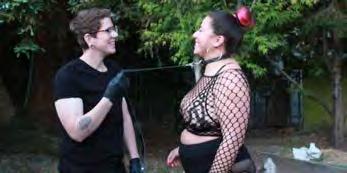

Retrial date in Rickleffs case to be set in June
by John Ferrannini
The date for a homicide retrial in the James Rickleffs case will be set June 20.
The retrial comes after a California appellate court reversed Rickleffs’ prior homicide and robbery convictions stemming from the 2012 death of a gay San Francisco hair stylist.
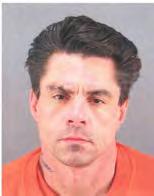
The June hearing date was determined at a court appearance Monday, April 15, in Department 22 at the San Francisco Hall of Justice at 850 Bryant Street. San Francisco Superior Court Judge Eric Fleming had Rickleffs –who is being held at Mule Creek State Prison in Amador County in the Sierra foothills – appear via Zoom. Joining the call were also Esmeralda Escalon, the mother of Steven “Eriq” Escalon, who was 28 years old at the time of his death, and the descedant’s friend Roberto Tiscareno.
Appearing in person were San Francisco Assistant District Attorney Julia Cervantes and Rickleffs’ new attorney, San Francisco Deputy Public Defender Will Helvestine.
The June 20 date was agreed upon by both Cervantes and Helvestine, Fleming said. Cervantes said she had requested a report created åtwo other documents. They need to be given to Helvestine as part of discovery, and Cervantes anticipated she’d have them in time for the trial setting date.
“My understanding is discovery from the previous attorney has been handed over to Mr. Helvestine,” Cervantes said.
As the Bay Area Reporter previously reported, Rickleffs, 57, was sentenced in 2021 to 50 years to life in state prison. That conviction, however, was overturned by a state appellate court last October. The charges stem from 2012, when, according to prosecutors, Escalon and Rickleffs met during underwear night at the bar 440 Castro in San Francisco’s LGBTQ neighborhood.
“Rickleffs, as a straight-identifying man, went to the Castro with tape and a knife, sat there drinking, and I believe snorted narcotics in the bathroom, waiting for someone,” Tiscareno said during the August 2021 sentencing hearing.
After going home with Escalon to his Diamond Heights apartment early on the morning of June 12, 2012, prosecutors said Rickleffs tied Escalon up, gagged him, and poured poppers on his face to immobilize him. Then he left Escalon’s apartment with a suitcase of items including a laptop, Escalon’s checkbook, and a bankcard of one of Escalon’s roommates.
See page 10 >>
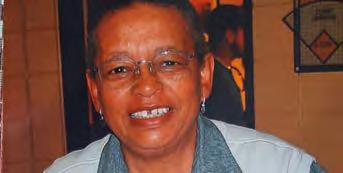


With book, CBS reporter Vigliotti recounts covering a warming planet
by Matthew S. Bajko
In 2018, Jonathan Vigliotti was working as a foreign correspondent based out of CBS News’ London bureau. To say it was a coveted journalism job would be an understatement.
Yet, as he recounts in his debut book, “Before It’s Gone: Stories From the Front Lines of Climate Change in Small-Town America,” Vigliotti’s life would be upended professionally and personally by a warming planet. During a Cape Cod vacation that August with his family and husband, Iván Carrillo, Vigliotti fielded a call that had him making a hasty exit – leaving his lobster dinner untouched – to catch a flight for Southern California.
He was sent to cover a wildfire encroaching on the city of Lake Elsinore in Riverside County. The impromptu assignment led to him relocating to the national broadcaster’s Los Angeles Bureau the next year and taking on the natural disaster beat.
“In the time between then and now I have covered historic hurricanes, thermometer-shattering heat waves, record-breaking droughts, mega wildfires, back-to-back ‘hundred-year floods,’ unprecedented blizzards,
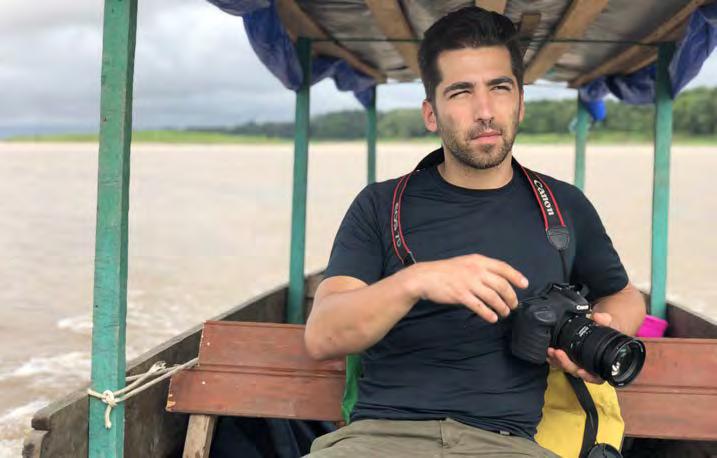
CBS News national correspondent Jonathan Vigliotti has written a new book on climate change.
and never-before-seen mudslides,” he writes in the prologue of his book.
Inc., the book not only recounts his experiences covering a warming planet these past six years. It also serves as a memoir of his rising
Mission district LGBTQ homeless shelter back post-COVID
by John Ferrannini
Ahomeless shelter for LGBTQ adults in San Francisco is at its full capacity of beds after having been shuttered during the COVID pandemic.
Jazzie’s Place is located at 1050 South Van Ness Avenue in the Mission neighborhood and overseen by Dolores Street Community Services. According to Manuel Pina, a straight ally who is director of housing and shelter programs for DSCS, it reopened June 6, 2022 and has slowly increased the number of beds from eight, reaching the full, pre-COVID capacity of 24 in December 2023.
It had started at a lower capacity, Pina stated in an email to the Bay Area Reporter, in order to comply with San Francisco Department of Public Health COVID protocols.
“Operations are going well, we have currently two beds available at Jazzie’s because of some recent transfers/move-outs (in the female-identified-only section), currently working with our referral partners to fill out those beds,” Pina stated.
“Jazzie’s has three sections: female-identified, male-identified and gender-nonconforming/nonbinary,” he added.
The basic reservation to stay at Jazzie’s is 90 days, Pina said, but people can keep extending.
“There’s no limit as long as the criteria is being met, people can keep extending,” Pina said.
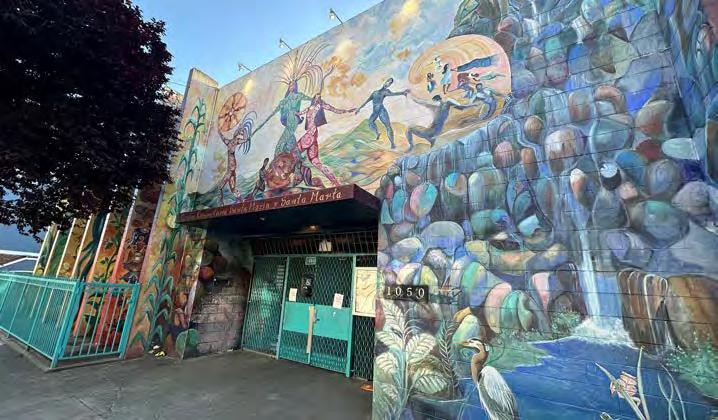
A Jazzie’s program manager did not return a request to speak with a shelter resident.
Jazzie’s was created “primarily to provide safe emergency shelter for folks of the LGBTQ+ collective, experiencing chronic homelessness and abuse/discrimination,” Pina stated. It had closed July 4, 2020 when DSCS began to operate a
shelter-in-place hotel, as the B.A.R. previously reported.
At that time, some 15 people were moved to the hotel; the identity of the hotel was not disclosed.
See page 10 >>

Serving the lesbian, gay, bisexual, transgender, and queer communities since 1971 www.ebar.com Vol. 54 • No. 16 • April 18-24, 2024 Japanese Prints ARTS 13 13 ARTS Jane 'Jae' Whitaker dies 08 06 The Toys for kinksters Untitled-2 1 4/3/24 12:26 PM 'The Tutor'
Jazzie’s Place, a shelter for unhoused LGBTQ adults, is now operating at full capacity in the city’s Mission neighborhood. John Ferrannini
Released in April by One Signal Publishers/ Atria Books, a division of Simon & Schuster
>>
Iván Carrillo
See page 2
A new trial for James Rickleffs will be set in June after a California appellate court overturned his murder conviction.
Courtesy SFPD
Judge tosses suit against Wiener’s trans
by John Ferrannini
Afederal court threw out a lawsuit
April 8 that claimed California’s Transgender State of Refuge Law is unconstitutional.
Our Watch with Tim Thompson filed suit against Attorney General Rob Bonta on March 7, 2023, alleging Senate Bill 107 – authored by gay state Senator Scott Wiener (D-San Francisco) – violated parental rights.
SB 107 was signed into law by Governor Gavin Newsom (D) in 2022, as the Bay Area Reporter previously reported, and went into effect last year.
The law contains three main components. It prohibits California law enforcement from cooperating with other states in enforcing laws that authorize agencies of those states to remove a child from their parent or guardian based on the parent or guardian receiving genderaffirming care.
It also prohibits compliance with any out-of-state subpoenas seeking health or other related information about people who come to California seeking genderaffirming care, if the subpoena relates to efforts to remove trans children from their parents. Lastly, it restricts law enforcement from arresting or extraditing

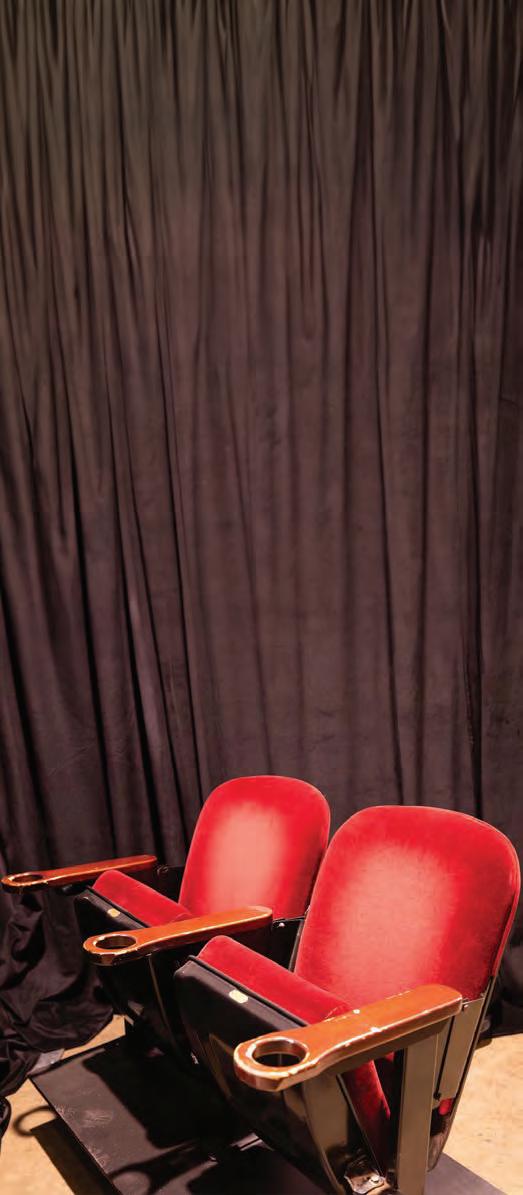
individuals to other states for receiving or providing gender-affirming care where that conduct is lawful in California.
The law made California a “refuge for trans kids and their families,” in the words of a 2022 Newsom news release. The conservative nonprofit Our Watch with Tim Thompson filed suit in the United States District Court for the Eastern District of California alleging that SB 107 is unconstitutional.
In its civil complaint, Our Watch with Tim Thompson claimed it had been directly harmed by the legislation.
“Since the enactment of SB 107, Our Watch has diverted resources from its other focus areas like critical race theory and abortion rights to counteract the harms of SB 107. The organization has implemented new educational outreach programs outside of California and even funded de-transitioning teenagers to come on the organization’s podcast to speak on the issue,” the group contended in its civil complaint.
Judge Dale Drozd disagreed. He granted a defense motion to dismiss the case April 8. In his decision, Drozd stated that “plaintiff’s decision to place more focus and correspondingly commit more of its resources to ‘transgender issues’ (at the expense of ‘local issues’) was a voluntary decision – not a forced one.”
“Plaintiff does not allege what injury it would have suffered if it had instead decided to continue spending the same amount of time and money on ‘local issues affecting parents like school policies and topics like critical race theory,’” Drozd stated.
Wiener touted the legal victory in a statement.
“Transgender people just want to live their lives authentically and in peace, and California is defending their right to do so,” Wiener stated. “This ruling shows once again that trans people are living
<< CBS reporter
From page 1
through the journalism ranks, from working for the NPR station based on the Bronx campus of his alma mater, Fordham University, to now being a national correspondent for CBS News.
“I always loved storytelling,” said Vigliotti, 41, who grew up in the village of Mount Kisco in New York.
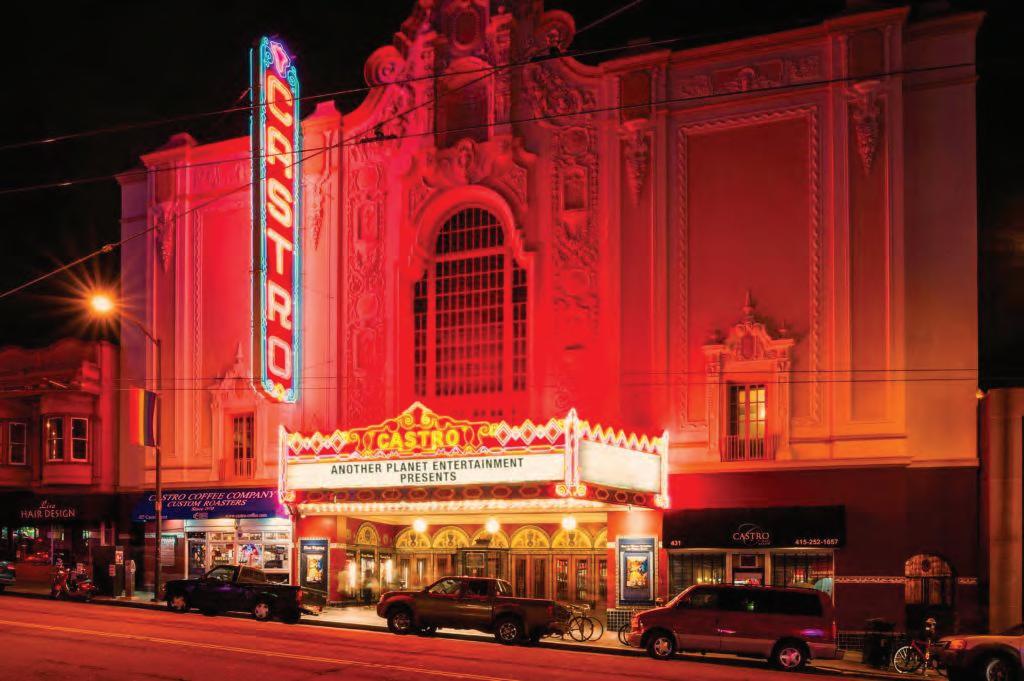

Speaking with the Bay Area Reporter by phone, Vigliotti said he’s been a nature lover his entire life. He spent hours exploring the woods by his childhood home. When his parents joined the fight to stop a housing development that would have bulldozed his forested retreat, Vigliotti learned about the fragility of ecosystems and how collective actions can protect such places.
“It had a lasting impact on me,” he said. “My work as a professional journalist always has gravitated toward environmental stories.”
His book is broken into four parts centered on the elements of fire, water, air, and earth. The tragic events he’s covered are paired with
Letters >>

authentically in California without any of the negative impacts on those around them of which right-wing zealots accuse them. California’s leadership is united in defending transgender people, and LGBTQ people generally, from the vicious attacks they face in other states.
“I thank Attorney General Bonta and his team for their incredible work securing this major civil rights victory,” Wiener added.
In a statement issued April 9, Bonta called the judge’s ruling “a major win for transgender children and their families in California and across the U.S. amidst a growing assault on LGBTQ+ rights nationwide. My office stands ready to defend SB 107 to ensure transgender and gender-nonconforming individuals obtain the care that empowers them to lead healthier, happier lives.”
The complaint
The complaint listed three causes of action, the first being violation of the
solutions to mitigate the effect rising temperatures are having on communities across the U.S. (Vigliotti writes about reintroducing beavers to ward against wildfires in an excerpt of his book for this week’s Guest Opinion on page 4.)
“One of the reasons why I wrote the book is I feel climate change is abstract to people. Even people who may be climate deniers, I think that comes from a lack of understanding,” said Vigliotti. “One of the best ways to understand climate change is radicalizing our weather is to be there on the front lines. Through our reporting, I try to visually connect those dots for people.”
‘No warning’
A theme throughout the book is the oft repeated – and disingenuous – phrase, “There was no warning.” Time and time again local officials have known beforehand the threats their communities face from climate change, said Vigliotti.
“Why this happens is hard to say, but I do believe a lot of people find climate science to be overwhelming,” he said. “The solutions often-
New Conservatory responds to review
Maya Angelou once said, “When someone shows you who they are, believe them the first time. People know themselves much better than you do. That’s why it’s important to stop expecting them to be something other than who they are.” It is in this spirit that I write this letter in response to the recently published Bay Area Reporter review of the New Conservatory Theatre Center’s production of Jewelle Gomez’s new play “Unpacking in P’Town.”

Theater is an art form that is meant to promote exploration of the human condition. It can take us to places both familiar and foreign. It is also a subjective event that relies not only upon what the characters’ life experiences are in any given story but also the lived experiences that are brought into the room when the audience arrives. Naturally, varied opinions will abound regarding the impact of and connection to the storytelling. This is to be expected.
What is also expected is that a queer publication and its
due process clause of the 14th Amendment to the U.S. Constitution.
“SB 107 violates the Due Process Clause by stripping parents of their fundamental right to direct the upbringing and care for of [sic] their child, including accessing their child’s medical records as it relates to ‘gender-affirming care’ or ‘gender-affirming mental health care,’” the complaint states.
The second cause of action was violation of freedom of association in the First and 14th Amendments to the U.S. Constitution.
“The enforcement of SB 107 is the direct and legal cause of the deprivation of parents’ constitutionally protected rights under the First and 14th Amendments to the association, companionship, and society of parent and child,” the complaint states.
The third cause of action was violation of the full faith and credit clause of Article IV of the Constitution, which the suit mistakenly states is found in the Fourth Amendment.
“The Full Faith and Credit Clause demands that state court judgments be accorded full effect in the courts of other states and precludes states from adopting any ‘policy of hostility’ toward the public acts of another state,” the complaint states. “SB 107 violates the Full Faith and Credit Clause because the bill was passed as a direct ‘policy of hostility’ towards statutes passed in other states, which restrict or criminalize gendertransition procedures for minors.”
The plaintiff was represented by the nonprofit firm Advocates for Faith and Freedom. Attorney Bethany Onishenko stated, “This decision is but a small setback.”
“The judge did not rule on the merits of SB 107. We remain committed to fighting this outrageous bill and believe that when SB 107 is decided on the merits, we will prevail,” she stated.t
times seem daunting.”
Rather than dismiss climate change as “some politicized issue,” he hopes his audience sees it as the threat it is to their livelihoods and hometowns. He utilizes the term “habitat changes” in the book when writing about what is occurring due to changing climates.
“If saying climate change is a barrier for some people, maybe you don’t need to say it,” said Vigliotti. “As long as people understand weather is changing and an increased threat to communities on the front lines, the more people are willing to take action. That is my finding at least,” he said.
He believes the planet still has time before it’s gone.
“We are a very intelligent species, us humans. We have proven time and time again we have a unique ability to adapt, unlike some other species,” said Vigliotti. “I think we have an opportunity if we listen to the warning signs and take action to rebuild or upbuild our communities so they are resilient.”
See page 10 >>
reviewer would not be indifferent to, or unable to imagine and understand, a story that highlights the challenges of living in a racist and homophobic country such as ours. And yet, that seems to be exactly what this reviewer has gotten wrong. A place where your inherent identity can invite emotional and physical violence, makes finding family in one another and a safe place to be together a lifesaver. This has been true throughout our history and for many of us, existing in the shadows is still a way of life.
In the embrace of a seaside resort of yesteryear the characters in this play call on each other and all of us to remember that respect, kindness, and equity are timeless universal desires.
Ed Decker, Founder and Artistic Director New Conservatory Theatre Center San Francisco
2 • Bay area reporter • April 18-24, 2024 t OWN A PIECE OF THE CASTRO THEATRE! OWN A PIECE OF THE CASTRO THEATRE! OWN A PIECE OF THE CASTRO THEATRE! OWN A PIECE OF THE CASTRO THEATRE! OWN A PIECE OF THE CASTRO THEATRE! OWN A PIECE OF THE CASTRO THEATRE! CASTROTHEATRE.COM CASTROTHEATRE.COM MORE INFO MORE INFO Buy a Castro Theatre orchestra level seat and support these community non-profit partners Buy a Castro Theatre orchestra level seat and support these community non-profit partners OASIS ARTS CASTRO ORGAN DEVOTEES ASSOCIATION (CODA) OASIS ARTS
ORGAN DEVOTEES ASSOCIATION (CODA)
CASTRO
<< Community News 420 At The Apothecarium DAILY 420 DEALS STARTING 4/13 OF PRODUCTS WORTH OVER $200 ON APRIL 20TH ONLY SPEND $125+ GET A $1 420 MYSTERY BAG INONLYSTORES WHILE SUPPLIES LAST C10-0000515-LIC
refuge law
State Senator Scott Wiener declared victory after a judge tossed a lawsuit against his trans refuge law.
Courtesy Sen. Wiener’s office
Soccer and cider team up for Earth Day Community
compiled by Cynthia Laird
The Oakland Roots Sports Club, a professional soccer team in the East Bay city, has announced a partnership with the local queer-owned Sincere Cider company timed with Earth Day, which is formally observed Monday, April 22, but celebrated all month.
The Roots and the cidery have introduced Sincere Cider OAK, a unique oak-aged hard cider. In a move to support environmental sustainability, a portion of proceeds from every case sold will be contributed to Trees for Oakland, a local nonprofit dedicated to enhancing the city’s urban forest. According to a news release, the initiative reflects a shared commitment to improving the local environment, with a focus on Oakland’s most impacted neighborhoods.
Bex Pezzullo, a queer native Californian, started Sincere Cider several years ago, as the Bay Area Reporter noted in a September 2023 Business Briefing column.
Sincere Cider crafts its beverages with a special blend of culinary apples and French wine yeast, the release noted, ensuring a perfectly blended flavor. Sincere’s seasonal and limited releases have already supported the planting of over 2,000 trees in California wildfire burn scars, the release added.
These days, the product can be found in numerous retail stores, as well as at Oakland Roots soccer matches, which are being played at Cal State East Bay’s Pioneer Stadium in Hayward this season. (The team plans to play home matches at the Oakland Coliseum in 2025.)
“By teaming up with Oakland Roots
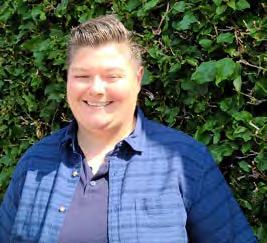
and our local retail partners for the release of OAK, I know we are all coming together to make a contribution to the urban forest and help repair the urban canopy throughout Oakland – a city we all love and are committed to supporting,” Pezzullo stated.
Andrea Lepore, vice president of brand partnerships for the Roots and its women’s team, Oakland Soul, added, “This Earth Day, we’re inviting our fans to join us in our collaboration with a can of OAK cider to help plant trees and combat heat island effects in our most vulnerable neighborhoods.”
Sincere Cider’s OAK (5.9% alcohol by volume) will be available for a limited time at East Bay retailers, bars, and exclusively at the Oakland Roots home match Saturday, April 27, at 7 p.m. against the Colorado Springs Switchbacks. The team has designated the match its “Clean and Green Night.”
For more information on Sincere Cider, go to sincerecider.com. For more information on the Oakland Roots, go to oaklandrootssc.com. For more information about Trees for Oakland, go to treesforoakland.org.
Rainbow flag virtual town hall postponed
The virtual town hall about the proposed landmarking of the giant rainbow flag at Castro and Market streets has been postponed until after a city panel reviews the plan.
The Gilbert Baker Foundation, which is spearheading the landmarking effort of Baker’s oversized rainbow flag and flagpole at the gateway to the LGBTQ
Castro neighborhood, had planned to hold the online meeting Thursday, April 25, as the B.A.R. previously reported.
However, Charley Beal, a gay man who is president of the foundation, informed the B.A.R. this week that the town hall likely will take place in May. The city’s historic preservation commission is now expected to hear the proposal at its May 15 meeting, Beal stated in an email.
No new date for the town hall was given, but Beal stated it would be after
the HPC meeting.
The B.A.R. reported earlier this month that the Board of Supervisors approved a resolution by gay District 8 Supervisor Rafael Mandelman to begin the city landmarking process for the flag. Baker, a gay man who co-created the first eight-color rainbow flag in 1978, is generally credited with turning the now-standard sixcolor banner into a worldwide

symbol for LGBTQ rights. Baker died in 2017. He worked with former San Francisco mayor Willie Brown to have the oversize flag installed in the Castro in 1997, which marked the 20th anniversary of slain supervisor Harvey Milk’s election to the board. Milk and then-mayor George Moscone were killed in their City Hall offices in November 1978 by disgruntled former supervisor Dan White.
Outdoor downtown SF arts celebration
Create, a free, outdoor immersive visual and performing arts celebration – spotlighting San Francisco’s creative past, present, and future – will take place Thursday, April 25, from 4 to 8 p.m. at Landing at Leidesdorff, downtown’s newest destination located at the intersection of Commercial and Leidesdorff streets.

New Affordable Homes for Sale in Mission Bay
148 Below Market Rate Condominium for middle-income, first-time homebuyers. One-bedroom, two-bedroom and three-bedroom homes priced from $260,000 - $501,000 without parking will be available. Applicants must be a first-time homebuyer and earn no more than the income levels listed below:



April 18-24, 2024 • Bay area reporter • 3 t
Person $110,950 Two People $126,850 Three People $142,650 Four People $158,500 Five People $171,200 Six People $183,850 Household Size Maximum Annual Income
One
for the Hard Hat Tours Today! • Saturday, April 27th | 10:00am - 12:00pm • Friday, May 3rd | 11:30am - 1:30pm • Wednesday, May 8th | 4:00pm - 6:00pm Apply online through DAHLIA, the SF Housing Portal at www.housing.sfgov.org | Applications Due May 31st All material is intended for informational purposes only and is compiled from sources deemed reliable but is subject to errors, omissions, changes in price, condition, sale, or withdrawal without notice. Floor plans are drawn to varying scales to maximize visibility when printed. The floor plans, elevations, renderings, features, finishes and specifications are subject to change at any time and should not be relied on as representations, express or implied. Square footage or floor areas shown in any marketing or other materials is approximate and may before or less than the actual size. This is not intended to solicit property already listed. No financial or legal advice provided. Equal Housing Opportunity. 400 China Basin is part of the City’s Limited Equity Program and buyers must qualify for the program to be eligible. Photos may be virtually staged or digitally enhanced and may not reflect actual property conditions. Real estate consulting, sales and marketing by Polaris Pacific - a licensed California, Arizona, Colorado, Hawaii, Oregon and Washington broker CA DRE #01499250 Register today! www.400ChinaBasin.com
Register
News>> See page 10 >>
Bex Pezzullo, owner of Sincere Cider, has partnered with the Oakland Roots soccer club and Trees for Oakland in observance of Earth Day. Cynthia Laird


Name new SOMA park for Sullivan
There’s a final online public survey being commissioned by the San Francisco Recreation and Park Department and South of Market community organizations to determine the name of a new park at Natoma and 11th streets. This park will be an asset to the community, and it’s fitting that one of the names suggested – and which finished first in the preliminary round – would honor the late Rachele Sullivan, a leatherwoman who died two years ago –and too soon at the age of 54. We support the effort to name the park for her.
Sullivan was an integral part of the city’s leather community, as the Bay Area Reporter’s obituary for her noted.
She was active in the Folsom Street Fair and served on the board of Folsom Street, the entity that produces the leather and kink extravaganza every September, as well as the Up Your Alley Fair in late July and other events. One of the things Sullivan did in that capacity was help launch Venus’ Playground, the women’s space at the Folsom Street Fair, according to Demetri Sparks, a gay man who used to be executive director of the organization.
Sullivan identified as a cis straight ally, and her legacy is tied to the leather community, which is not exclusively LGBTQ, though queers are a big part of it.
Just as important as Sullivan’s work with Folsom Street is the effort she put into helping establish the Leather & LGBTQ Cultural District, which is adjacent to the new park. She believed in the power of community, and of the city recognizing the contributions of the leather folks. The Leather & LGBTQ Cultural District, the world’s first, was approved by the San Francisco Board of Supervisors in 2018. It was incorporated in June 2019, according to its website, and has since become an active player in the SOMA neighborhood, along with several other community groups, as we have reported over the years.
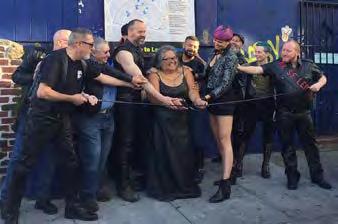 Liz Highleyman
Liz Highleyman
2018 to celebrate the designation of San Francisco’s Leather and LGBTQ Cultural District.
trict manager, noted other communities of which Sullivan was a part.
“We have proposed that the new park at 11th and Natoma be named after Rachele Sullivan, a prominent figure in the leather, Filipino, and Indigenous communities,” he wrote in an email this week. “A born healer and bridge-builder, Rachele was instrumental in the formation of the Leather & LGBTQ Cultural District. We believe it is a fitting tribute for a location at the intersection of those communities.”

Gayle Rubin, Ph.D., who specializes in leather history, told the B.A.R. that naming the new park after Sullivan was an excellent idea.
“It would be wonderful and utterly appropriate to name this park for Rachele Sullivan, who did so much for the queer and kinky communities in South of Market,” Rubin wrote in an email. “She worked tirelessly for many of our organizations, including the Folsom Street Fair and the Leather Alliance.”
Rubin also noted that Sullivan “was a builder of institutions and a major force in establishing Eagle
Plaza and the Leather & LGBTQ Cultural District.”
“Giving her name to the park would honor her extraordinary contributions and give her a permanent presence inåthe neighborhood to which she gave so much of her energy and her love,” Rubin added.
At the community meeting about the park earlier this year, Sullivan’s son, Sebastian Sullivan, talked about his mother.
“Rachele Sullivan was a beloved and respected traditional Filipino healer and community advocate born and raised in Ramaytush Ohlone land, San Francisco,” Sebastian Sullivan stated in a comment that Callahan shared with the B.A.R. “Her lineage included traditional healers from the province of Aklan, Philippines.
“Rachele thrived at the crossroads of so many communities and stood as a beacon of humanity, compassion, and generosity for members of the disability, leather, and Filipino communities in the SOMA district and beyond,” Sebastian Sullivan added. “It is so fitting that her communities have nominated her to be the namesake for the park that marks the intersection of the communities that she supported and loved.”
According to the details from the SOMA West Community Benefit District, the final park naming decision will be based on survey results, input from community leadership organizations, and the San Francisco Recreation and Park Department. The decision-making process aims to consider broad community support and engagement, SOMA West added.
The online survey link is at https://tinyurl. com/6kzm5eu6. According to a Rec and Park spokesperson, the deadline to vote is Wednesday, May 1.
It would be a fitting and lasting tribute to name the new SOMA park for Sullivan. Her contributions have helped countless people enjoy freedom and community in San Francisco, a city she loved. t
Cal Callahan, a gay man who is the cultural dis-
Nature’s way
by Jonathan Vigliotti
In Northern California, a month’s worth of rain poured on a burn scar in a single day. This violent runoff was so powerful, it caused mudslides and landslides, quickly inundated rivers, and shattered a levee near Galt, California, that had recently been restored to last until 2050. In a matter of minutes, entire communities were swallowed by floodwater.

I’ll never forget the man who came up to me after I reported for Norah O’Donnell on the levee break. My team and I went live from New Hope Road, which had been flooded along with the vineyard it ran through. “By any chance have you seen a gray sedan on the side of the road while driving around today? My sister-in-law disappeared during the storm and we haven’t heard from her,” he said. He and his family had spent three days driving down country roads in a desperate search. “I’m sorry, I haven’t, and this is as far as we were able to go down this road,” I explained before his eye caught the top of what looked like a submerged car a hundred yards away, partially concealed by vines. My team and I had no idea a vehicle was even there. From our location, we watched as the man waded into the water and out to the car. He was too far away to hear, but I could read his body language as he slumped over, the palms of his raised hands on his shaking knees. His grief rippled the stagnant floodwater around him. Katherine Martinez was sixty-one years old when she drove off the road during the storm and drowned in its surge. Water in a state that needs more of it should be a blessing, but not when that same state is so dry it can’t store or even handle what’s fallen. At the time of my reporting from the flood at New Hope Road, the state had been planning a new series of water storage projects, including expanding reservoirs, but saw the adaptive initiative held up by permitting issues for nearly a decade. In Los Angeles County, voters – recognizing the state’s historic drought – approved extraordinary steps to avert crisis years ago. The Safe Clean Water Program, or Measure W, was passed in 2018 and allocates $300 million annually to projects that include adding cisterns and more green space to trap and absorb rainfall, while also removing asphalt and other “hardscape” that acts like a water park slide by shooting runoff into the Pacific instead of allowing the ground to absorb it. But like many things that involve government hands, Measure W has failed to make a splash. An investigation by the Los Angeles Times found that in three years, the county had
only set aside thirty acres of land for conservation efforts. Californians – like a growing number of Americans – want action, but their leaders are hanging them out to dry. And the holdup has proven costly in more ways than one. The nearly 36 trillion gallons of water that fell in the winter of 2023—that’s more water than what flows through the Amazon River every day – wasn’t enough to bring a permanent end to California’s drought. Much of the water was rapidly flushed into the Pacific.
While the West’s historic drought, wildfires, and mudslides have led to a reckoning and wanting of beavers, with so many of them removed from the landscape, reintroducing them now requires help from humans. And that’s how I first met researcher Nick Bouwes who, upon speaking with my producer Christian Duran, asked if we’d be up for building a beaver dam for a ranch owner in Utah and then releasing a few into their new home. Who says no to that?

Nick is the head of the Beaver Ecology and Relocation Center based out of Salt Lake City, Utah, and oversees a team of volunteers who travel across the West building “starter dams,” what’s technically known in the emerging industry as beaver dam analogues. That’s how I found myself waist deep in a babbling creek on a mountainous ranch in Coalville, Utah, slinging handfuls of mud over layers of tree branches and sticks. The landowner had heard about Emily Fairfax’s research and Nick’s relocation project and wanted in. “Too much water can be a bad thing, but when there’s none of it and crops are dying and ranchers are selling off their cattle and there’s no end in sight, well, that’s enough to change people’s opinions,” Nick said as he grabbed a pile of mud from the bank of the creek. “Beavers, what they do is they get in here and they scoop the mud up, they just come and grab a whole bunch, push it with their chest and hand and it into the crevasses. I would get on my belly and push it in, but I don’t want to do that yet,” he chuckled.
Nick had a thick crop of brown hair and a stubbled face. His brown eyes, which squinted even in the shade, remained focused on our project. He looked all business, but the occasional crack of a smile let me know he didn’t take himself too seriously. It amazed me how much work went into something that should be – as it had once been – natural. “A lot of these streams, if it’s too shallow, beavers can’t defend themselves. They’re just kind of like walking hot dogs for predators. They need deep water to swim,” Nick said as he handed me more branches that
had been freshly cut by his volunteers. Decades without beavers meant there weren’t deep enough streams to relocate them to without human intervention.
Building a beaver dam is wet and dirty work, but fortunately not an exact science. It took about thirty minutes to create a pool about four feet deep. “This should be a safe space for the guys we’re releasing today.” Those “guys,” a male and a female if I’m being accurate, were resting in cages kept in the back of an air-conditioned van. Beavers are nocturnal animals. It’s rare to see one, let alone see one just a few feet away. I was excited to get an up-close look.
I stared into the black, pebble-sized eyes of the beaver we’d soon be releasing. He looked like a cross between a guinea pig and a sea otter and was surprisingly cute. I’ve always loved animals, yet never gave the beaver much thought before. Why? “He’s about ninety pounds, but at least he’s not kicking around,” Nick said as he wired the cage the beaver was in onto the wooden arm of a shovel. I grabbed one end and Nick the other and, in what looked like a makeshift gondola, we airlifted the beaver down the steep canyon to the analogue dam we had just built. “This guy came to us from another ranch, where it was causing trouble.”
I was still looking into our beaver’s tiny blinking eyes and could tell he was confused. Instinctively he must have known most beavers, once in cages, don’t make it out alive. If we are to believe the sounds and gestures of an animal allow them to communicate on a basic, primal level, then it seems logical to think this guy’s mother warned him of humans, just like his mother’s mother warned her. That probably explains why, when we opened the cage near our handmade dam, he looked at us for a second before cautiously waddling out and slipping into the stream. The water flowed over his thick coat like melted chocolate. A pair of volunteers released the female beaver a few yards upstream. “The goal is for them to meet naturally and colonize this dam together. The odds are good for them here,” Nick said as we watched them inspect their new home, and later, each other. “They look happy.” t
4 • Bay area reporter • April 18-24, 2024 t << Open Forum Volume 54, Number 16 April 18-24, 2024 www.ebar.com PUBLISHER Michael M. Yamashita Thomas E. Horn, Publisher Emeritus (2013) Publisher (2003 – 2013) Bob Ross, Founder (1971 – 2003) NEWS EDITOR Cynthia Laird ARTS & NIGHTLIFE EDITOR Jim Provenzano ASSISTANT EDITORS Matthew S. Bajko • John Ferrannini CONTRIBUTING WRITERS Christopher J. Beale • Robert Brokl Brian Bromberger • Victoria A. Brownworth Philip Campbell • Heather Cassell Michael Flanagan •Jim Gladstone Liz Highleyman • Brandon Judell • Lisa Keen Philip Mayard • Laura Moreno David-Elijah Nahmod • J.L. Odom • Paul Parish Tim Pfaff • Jim Piechota • Adam Sandel Jason Serinus • Gregg Shapiro Gwendolyn Smith • Charlie Wagner Ed Walsh • Cornelius Washington • Sura Wood ART DIRECTION Max Leger PRODUCTION/DESIGN Ernesto Sopprani PHOTOGRAPHERS Jane Philomen Cleland Rick Gerharter • Gooch Jose A. Guzman-Colon • Rudy K. Lawidjaja Georg Lester • Rich Stadtmiller Christopher Robledo • Fred Rowe Shot in the City • Steven Underhill • Bill Wilson ILLUSTRATORS & CARTOONISTS Christine Smith VICE PRESIDENT OF ADVERTISING Scott Wazlowski – 415.829.8937 NATIONAL ADVERTISING REPRESENTATIVE Rivendell Media – 212.242.6863 LEGAL COUNSEL Paul H. Melbostad, Esq. Bay area reporter 44 Gough Street, Suite 302 San Francisco, CA 94103 415.861.5019 • www.ebar.com A division of BAR Media, Inc. © 2024 President: Michael M. Yamashita Director: Scott Wazlowski News Editor • news@ebar.com Arts Editor • arts@ebar.com Out & About listings • jim@ebar.com Advertising • scott@ebar.com Letters • letters@ebar.com Published weekly. Bay Area Reporter reserves the right to edit or reject any advertisement which the publisher believes is in poor taste or which advertises illegal items which might result in legal action against Bay Area Reporter. Ads will not be rejected solely on the basis of politics, philosophy, religion, race, age, or sexual orientation. Advertising rates available upon request. Our list of subscribers and advertisers is confidential and is not sold. The sexual orientation of advertisers, photographers, and writers published herein is neither inferred nor implied. We are not responsible for unsolicited manuscripts or artwork.
Rachele Sullivan, center, cut the ribbon outside the old Stud bar on June 12,
Signal
of
& Schuster Inc. To purchase the book, go to https://tinyurl.com/stndp3ay
Jonathan Vigliotti, a gay man, is a national correspondent for CBS News. This excerpt is from “Before It’s Gone” by Jonathan Vigliotti. Copyright © 2024 by Jonathan Vigliotti. Reprinted by permission of One
Publishers/Atria Books, a Division
Simon
Courtesy Simon & Schuster Inc.
Bi Palo Alto council candidate Causey calls for Pride event
by Matthew S. Bajko
Akey part of Palo Alto City Council candidate Katie Causey’s platform is seeing her hometown host its own Pride event. Such is the need for having a local celebration in support of the city’s LGBTQ residents that Causey has made it the number one issue listed on her “Katie’s Vision for Palo Alto” page on her campaign website.
In addition to throwing its own LGBTQ festival, Palo Alto should hold local festivities for Diwali, Lunar New Year, Nowruz, and other culturally important dates and holidays, argues Causey, who is bisexual and serves on her city’s human relations commission.
In particular, she would like to see a Pride parade wend its way through the Silicon Valley city’s downtown where she lives. She had first raised the idea in a guest opinion piece last November for Palo Alto Online.
“Palo Alto is a diverse community. But we don’t always give that diversity vehicles to thrive,” noted Causey, 30, in a recent phone interview with the Bay Area Reporter. “In nearby Redwood City in its downtown any time of the year there is some sort of cultural celebration going on, whether for Pride or for Lunar New Year. That is what I want to see for Palo Alto, to see the many communities in this city being so openly celebrated.”
The South Bay is already home to a number of LGBTQ events, the largest being the annual Silicon Valley Pride held in downtown San Jose in late summer. This year it will take place August 24-25.
Individual cities in Santa Clara County, such as Sunnyvale and Cupertino, have hosted their own local Pride events in recent years. Amid municipal Pride celebrations being canceled in 2021 due to COVID, the Department of Surgery at Stanford University started hosting a parade on the campus located in Palo Alto and will do so again this June 5.
A 28-page report released in 2019 by the city’s human relations commission about the needs of the local LGBTQ community, particularly young people, had broached the idea of seeing a municipal Pride celebration. It included a quote from a same-sex married parent of two children who said the visibility such an event would bring was important for their family.
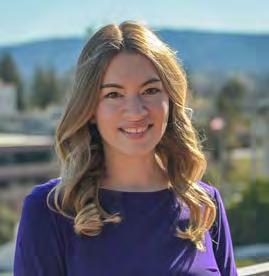
ity group for city employees who could maybe take the lead in coming up with suggestions for holding a Pride event. Alas, she found out Palo Alto has no such employee resource group, so LythcottHaims said she encouraged Causey to work with others supportive of the Pride idea to come up with a formal proposal.
There is no reason to wait for Causey to be elected to a council seat to launch Palo Alto Pride, noted Lythcott-Haims.
“Whether Katie gets elected or not, it is well past time for a Pride event in Palo Alto,” she contended.
Causey told the B.A.R. she would love to see it be held during June, which is annually celebrated as LGBTQ Pride Month. Doing so also wouldn’t compete with the larger countywide event held each August, she noted.
“It is cool to see how each city makes it their own,” said Causey. “So many cities are embracing Pride and making it their own, it makes Palo Alto look behind, especially when we have so many queer youth and they have to go to other cities to be celebrated.”
As a human relations commissioner, Causey said she has taken part in listening sessions with city residents who have expressed “strong interest” in seeing Palo Alto host community cultural events. The city is in the process of hiring staff to help oversee them, she noted.

“So the pieces are coming together. The community is interested; staff is getting in line, and the council is interested,” said Causey. “It is very close to becoming a reality.”
“I would LOVE to see an annual Palo Alto Pride event, or at least for one of our existing city street fairs or parades to have a significant LGBTQ+ component,” they were quoted as saying.
While the report didn’t specifically call on city leaders to launch a Pride event, it did make note that one of the “greatest” needs was “more visibility” for the local LGBTQ community. Among its suggestions was for the city to focus its efforts “on programming, visibility and space” and “develop messaging and host events to gain visibility.”
Palo Alto City Councilmember Julie Lythcott-Haims, who is Black and biracial, queer and bisexual, told the B.A.R. she wholeheartedly agrees with Causey about the need for the city to hold its own Pride celebration. While it may not be able to do so this June during Pride Month, Lythcott-Haims said she has also inquired with city staff about planning for such an event.
“I want to emphatically say that I want Palo Alto to have a Pride event,” LythcottHaims told the B.A.R. April 15 during a phone interview.
She recalled attending Redwood City Pride with her partner and co-parent, Dan Lythcott-Haims, and seeing all of the city councilmembers in attendance. It struck a lasting impression.
“My city isn’t doing anything like this,” she recalled telling them that day. “We definitely need to do something.”
Lythcott-Haims inquired with her city manager if there was a queer affin-
teachers on City Council than school board,” said Causey, who is single.
Two incumbents are expected to seek reelection, leaving two council seats open. While Lythcott-Haims has yet to endorse Causey, as she is waiting to make endorsements in the race closer to the filing deadline in early August, she did speak highly of her and her candidacy when talking to the B.A.R. this week.
“I am super excited that Katie is in the race,” she said. “I think her being progressive, queer, and young is a real asset. I think she offers a perspective that our city needs to hear.”
Lythcott-Haims is one of at least three LGBTQ community members who have served on the Palo Alto City Council. LaDoris Hazzard Cordell, a lesbian and retired Santa Clara County Superior Court judge, won election in 2003 and served a single term. Sid Espinosa, who is gay and served in the city’s ceremonial mayor role, was elected in 2008 and served for two years. It is unclear how well known either’s sexual orientation was at the time by voters. Biographies of the two do not highlight Cordell being the first lesbian on the council or Espinosa its first gay male councilmember, though he stakes claim to being its youngest mayor at age 38 and its first Latino councilmember.
When she ran in 2022, LythcottHaims not only mentioned her sexual orientation and racial identity on her campaign website bio but highlighted the sentence in bold. Nonetheless, her candidacy and election didn’t gain much attention outside of Palo Alto at the time. (She, Cordell, and Espinosa are not listed among Santa Clara County’s out elected officials on the Queer Silicon Valley website.)
“With the rise of unabashed authoritarianism nationally, I think it is more critical than ever that those of us who are from communities that have been historically marginalized or maligned speak up about who we are. I think we are, frankly, in a battle for the soul of America right now,” said Lythcott-Haims, who dealt with homophobic comments as a council candidate. “The more we have people step up, and step forward, to say, ‘No, I am here, I am queer, I am not going anywhere,’ I think is important. These are scary times.”


An inaugural event likely could take place as soon as 2025, Causey told the B.A.R. She plans to request it be included in her advisory body’s goals for next year.
As for making it such a prominent part of her campaign platform, which also focuses on building more affordable housing and addressing climate change impacts on her city, Causey sees hosting local community celebrations as something with broad support and relatively easy to achieve.
“When people hear the phrase affordable housing or climate change, it can conjure a lot of different ideas for them. I wanted to start with something tangible that I know a lot of people in the community want to see,” said Causey.
A native Palo Alton Causey was born and raised in Palo Alto and has spent most of her adult life in the Bay Area. She left briefly to earn a bachelor’s degree in women’s studies from George Washington University on the East Coast.
Her professional career has largely been in the South Bay’s nonprofit sector; she now works as a community organizer at the Silicon Valley Bicycle Coalition. She narrowly lost her bid four years ago to the Palo Alto school board.
Nonetheless, it led her to question if she would again seek elected office. In March, she became the first person to declare their candidacy for one of the four council seats elected citywide that will be on the November 5 ballot.
“I started to realize I would be a lot more effective serving our families and
During a campaign event in a local park Lythcott-Haims recalled encountering a supporter of an anti-LGBTQ candidate for school board who referred to LGBTQ people as deviants. LythcottHaims, who came out in her 40s, choked up recalling the incident this week to the B.A.R.
“It was one of probably the first times I was confronted face to face about my queerness and made to feel somehow I am a deviant human being. It was all I could do not to cry,” said Lythcott-Haims, 56, who credited another council candidate, Alex Comsa, for coming over, giving her a hug, and walking them away from the woman.
They then held an event with their fellow candidates in front of city hall to denounce hateful campaign tactics. Causey told the B.A.R. she expects to be the lone out council candidate this cycle and is trying to not focus on any negative comments regarding her own candidacy.

Planning Ahead is Simple
Planning Ahead is Simple
The benefits are immense.
Planning Ahead is Simple
The benefits are immense.
The benefits are immense.
When you plan your life celebration and lasting remembrance in advance, you can design every detail of your own unique memorial and provide your loved ones with true peace of mind. Planning ahead protects your loved ones from unnecessary stress and financial burden, allowing them to focus on what will matter most at that time—you. Contact us today about the beautiful ways
When you plan your life celebration and lasting remembrance in advance, you can design every detail of your own unique memorial and provide your loved ones with true peace of mind. Planning ahead protects your loved ones from unnecessary stress and financial burden, allowing them to focus on what will matter most at that time—you. Contact us today about the beautiful ways to create a lasting legacy at the San Francisco Columbarium.
“I am aware they are there but don’t want them to be my main focus,” she said, adding she is excited about possibly doubling LGBTQ representation on the council. “It is nice when the city council can start to look more like the community it represents. It makes our policy decisions more effective for the community.”
As for Lythcott-Haims, who came up short in her bid for an open U.S. House seat in the March 5 primary where gay Assemblymember Evan Low (D-Cupertino) ended up in a three-way tie now subject to a recount, she plans to seek reelection in 2026.
“I am planning to run. I love the work,” she told the B.A.R. “You can assume I am.” t
When you plan your life celebration and lasting remembrance in advance, you can design every detail of your own unique memorial and provide your loved ones with true peace of mind. Planning ahead protects your loved ones from unnecessary stress and financial burden, allowing them to focus on what will matter most at that time—you. Contact us today about the beautiful ways to create a lasting legacy at the San Francisco Columbarium.
Proudly serving our Community.
Proudly serving the LGBT Community.
April 18-24, 2024 • Bay area reporter • 5 t Politics >>
FD
| San
SanFranciscoColumbarium.com
to create a lasting legacy at the San Francisco Columbarium. Proudly serving the LGBT Community.
1306 / COA 660 One Loraine Ct.
Francisco | 415-771-0717
FD 1306 / COA 660 One Loraine Ct. | San Francisco | 415-771-0717 SanFranciscoColumbarium.com Barry Schneider Attorney at Law •Divorce w/emphasis on Real Estate & Business Divisions •Domestic Partnerships, Support & Custody •Probate and Wills www.SchneiderLawSF.com 415-781-6500
by the California State Bar family law specialist* 315 Montgomery St , Ste. 1025, San Francisco, CA 94104
*Certified
Palo Alto City Council candidate Katie Causey wants the city to hold a Pride event. Courtesy the candidate
Couple crafts kink lifestyle for clients
by Matthew S. Bajko
Mel Andre long had worked in the building trade, serving as a contractor in their professional capacity. As for their personal pursuits, Andre is a daddy top in the kink scene.
Two years ago Andre, 38, who is gender fluid, queer, transgender, and nonbinary, met their partner, Jo Blossom, 33, a queer woman who is a switch, as they both top and are a power bottom, a little, and a sub in the kink scene.
A San Jose native who has “always been kinky,” Andre told the Bay Area Reporter they became more involved with the local scene in their 20s. Blossom, who grew up in Chicago and moved to the Bay Area a decade ago from Washington, D.C., started getting into the kink scene about seven years ago.
Jo Blossom is the name she goes by in the scene. A nonprofit executive, she did not want her given name published due to her keeping her professional and personal lives separate.
As the polyamorous couple cemented their own relationship and established contacts within the local kink and leather scene, they saw there was a need for a business that catered to people’s desire to outfit their homes with furniture geared toward their sexual fetishes or could rent for events. Thus, last June, they launched The Communal Toy
“What we are wanting to provide is kink furniture that is available to everyone,” said Blossom. “For us, myself as a femme, queer woman and Mel as a queer, nonbinary, trans person, we are not the center of the kink scene traditionally. For us, we wanted to really be focused on what does it look like for queer bodies, femme bodies, fat bodies to be able to access kink furniture that felt high quality, felt safe, and felt modeled to our bodies.”
Added Andre, “You can really see there is a lacking of space and access and so I wanted to, instead of saying, ‘I wish this thing existed,’ I realized we could just go make it ourselves.”
Not to mention the need for furniture that could safely be played on, said Blossom.
“As a bottom I played on a lot of really bad, unsafe furniture that was duct taped together and rickety,” she recalled. “I am not calling out anyone specific. It is just there is a need for us to feel safe and held in our play.”
som, noting it marked the first time their furniture “was in the world.”
Andre serves as the builder for the company, which currently markets two pieces clients can order. There is a st. andrew’s cross that allows the submissive partner to be restrained by their wrists and ankles, and a spanking bench for the bottom partner to kneel on.
“We were very well received and quite surprised by just the overwhelming response and excitement to have an opportunity to have kink back at Pride in a way that was on display, accessible and available,” said Andre. “A lot of people said they’d never seen kink furniture before or had an opportunity to play with it. It was a nice bit of feedback for us.”
A key feature of either piece is they are built to support up to 600 pounds “with ease,” as notes the company on its website.
Andre said they purposefully designed each piece with two full-bodied people in mind.
“As the builder I found that a lot of furniture available as ready made stuff, the maximum weight limit on those is often 250 pounds. Lots of people don’t feel safe, secure, or available to be on that furniture,” noted Andre.
They have refined their designs based on the feedback they receive from customers and seeing what issues arise from wear and tear on the furniture after use. For instance, they changed the type of foam cushioning they were using to one that lasts longer.
“If I send a piece out in the world and it comes back wobbly, I know I need to add some braces,” Andre said. “I try to use high-quality material that has high rigidity to it.”
Blossom interjected that Andre was being too modest and noted as “a great example” revisions they made to the spanking bench design. They wanted to ensure the platform was secure enough for use by someone with a wide body.

The couple publicly debuted their company at last year’s Dyke March event at Mission Dolores Park on the Saturday of Pride weekend. The couple set up a play space with several pieces of their kink furniture.
“We wanted to really showcase our furniture. It felt important for us to really bring kink back to Pride,” said Blos-
“Our bench is how many bolts, my god?” she asked.
To which Andre replied, “40.”
“What I have seen Mel thinking about from the very beginning is what does a big body look like?” noted Blossom. “How does it sit on a piece of furniture? What would be comfortable?”
As for the cost of their furniture pieces and rental services, the couple offers a sliding scale model. To purchase a piece of furniture, it can run from $500 to $800 per item and will take up to eight weeks to be delivered.
“I have built about eight pieces,” said Andre, who at the moment has turned their living room into their workspace.
Event rentals are sliding scale from $150-$300 per piece, with a required minimum event rental of $200. The couple will deliver the furniture, set it

up, monitor its use and clean it during the event, and break it down and remove it when done.
They also offer rentals for more personal events at a private home. The minimum cost is $150 and the sliding scale range is $150-$300 per piece for a standard 12-hour bloc of time.
At https://www.thecommunaltoy. com/rent is a fuller breakdown of their pricing scales, which they expect to raise in the future as demand increases. They are also considering charging a staffing fee, which they have yet to do.
“Living in the Bay Area we don’t have a lot of space in our apartment for a private dungeon. But a lot of people do want to play at home or do a scene at home or invite a couple friends over,” said Blossom. “We are able to deliver our furniture for private events at a home.”
Andre is setting up a shop space in the backyard of their Oakland home so they can have their living room space back. Blossom’s garage is being utilized to store their rental furniture.
“It is very Marie Kondo expertly organized to fit everything,” joked Andre.
As for the business’ name, it is a double entendre. It has a sexual connotation similar to a “pass around bottom” and refers to how the company’s furniture serves a communal purpose.
“By us offering a rental model, basically any space can be a dungeon or host a play party,” said Blossom. “It creates an opportunity for kink to live in untraditional places; that’s been really exciting to see.”
In addition to the couple’s business, Andre has also branched out into building personal dungeons for those involved in the kink and leather scene. They have been working with the owners of Paradox, a new club, event space, and playspace for the sex-

positive and BDSM communities set to open in San Francisco’s South of Market neighborhood.
“It is a separate thing from The Communal Toy for private clients,” said Andre. “I will come to whatever job site it is, if a personal home or private event space, speak with the clients and curate with them what their vision is. From there I will build out a price point from their needs.”
The cost is based on the scope of the work involved. Reaping a lucrative payout is not their aim, noted Andre.
“The truth is, what motivates me is accessibility for folks. I want people to have somebody they feel comfortable to work with and trust,” they said. “Having a private contractor come into your home, especially if you are a kinkster, can be quite invasive and exposing for folks.”
The couple took part last year in the entrepreneur training program offered by the city’s Leather & LGBTQ Cultural District based in western SOMA. As the Business Briefing column reported in January, the program provides training and assistance to businesses and aspiring entrepreneurs serving the San Francisco
31 Affordable Rental Units Available at 78 Johnson Street, San Francisco, CA 94130
31AffordableRentalUnitsAvailableat78JohnsonStreet,SanFrancisco,CA94130.21 one-bedrooms,2two-bedrooms,4three-bedroomsand4four-bedroomsareavailable. Rentsrangefrom$1,613-$3073permonth.
21 one-bedrooms, 2 two-bedrooms, 4 three-bedrooms and 4 four-bedrooms are available. Rents range from $1,613 - $3073 per month.
HouseholdsmustearnnomorethantheMaximumAnnualIncomebelow:
Households must earn no more than the Maximum Annual Income below:
leather and kink communities.
“It is nice there is something centering Folsom and the SOMA district and trying to keep kink in the neighborhood and trying to keep our roots where they are,” said Andre about the program.
The cultural district is planning to host a fifth cohort of applicants this July and is currently accepting applications from those interested in the program. Ideally, program graduates will open brick-and-mortar locations within the leather district’s boundaries, though it is not a prerequisite to apply.
“It would be a dream to have an event space where people could play on our furniture all the time,” said Blossom, adding the couple is also toying with hosting their own pop-up dungeon spaces.
The Communal Toy is planning to take part in the cultural district’s Play in the Plaza events it will be holding the second Saturday of the month through October. They will take place from noon to 5 p.m. at Eagle Plaza, the leather and kink-themed public parklet on 12th Street between Folsom and Harrison streets. (It was to have kicked off last weekend but had to be canceled due to the rainy weather.)
The couple has set up its furniture inside the Folsom Street Community Center run by the organization that puts on the neighborhood’s annual fetish street fairs.
“I love it is a community center and throwing a kinky party in a community center,” said Andre.
The Communal Toy is looking at participating in the Up Your Alley Fair in late July and plans to be back at this year’s Folsom Street Fair in the fall. It was hired as a vendor for the fair’s after party Deviants last September and volunteered to set up its furniture at the fair’s playground.
Applications and information can be found on DAHLIA - San Francisco Housing Portal at housing.sfgov.org. Applications are due by 5pm on May 1, 2024. Please call our information line at 415-287-0642 for more information.
ApplicationsandinformationcanbefoundonDAHLIA-SanFranciscoHousingPortalat housing.sfgov.org.Applicationsaredueby5pmonMay1,2024.Pleasecallourinformation lineat415-287-0642formoreinformation.
Units available through the San Francisco Mayor’s Office of Housing and Community Development and are subject to monitoring and other restrictions. Visit sf.gov/mohcd for program information.
ApplicationsandinformationcanbefoundonDAHLIA-SanFranciscoHousingPortalat housing.sfgov.org.Applicationsaredueby5pmonMay1,2024.Pleasecallourinformation lineat415-287-0642formoreinformation.
UnitsavailablethroughtheSanFranciscoMayor’sOfficeofHousingandCommunity Developmentandaresubjecttomonitoringandotherrestrictions.Visitsf.gov/mohcdfor programinformation.

UnitsavailablethroughtheSanFranciscoMayor’sOfficeofHousingandCommunity Developmentandaresubjecttomonitoringandotherrestrictions.Visitsf.gov/mohcdfor programinformation.
“At Folsom last year I got to witness folks setting up a fisting train on our spanking bench. It was the highlight of our Folsom,” said Blossom. t
Got a tip on LGBTQ business news? Call Matthew S. Bajko at (415) 829-8836 or e-mail m.bajko@ ebar.com.
6 • Bay area reporter • April 18-24, 2024 t
AMI 1Person 2Person 3Person 4Person 5Person 6Person 7Person 8Person 60% $60500 $69200 $77800 NA NA NA NA NA 65% NA $74950 $84300 $93650 $101150 NA NA NA 70% NA NA NA $100850 $108950 $117000 $125100 $133150 75% $75650 $86500 $97300 NA NA NA NA NA 80% NA $92250 $103750 $115300 $124500 NA NA NA 85% NA NA $110250 $122500 $132300 $142100 $151900 $161650
31AffordableRentalUnitsAvailableat78JohnsonStreet,SanFrancisco,CA94130.21 one-bedrooms,2two-bedrooms,4three-bedroomsand4four-bedroomsareavailable. Rentsrangefrom$1,613-$3073permonth. HouseholdsmustearnnomorethantheMaximumAnnualIncomebelow: AMI 1Person 2Person 3Person 4Person 5Person 6Person 7Person 8Person 60% $60500 $69200 $77800 NA NA NA NA NA 65% NA $74950 $84300 $93650 $101150 NA NA NA 70% NA NA NA $100850 $108950 $117000 $125100 $133150 75% $75650 $86500 $97300 NA NA NA NA NA 80% NA $92250 $103750 $115300 $124500 NA NA NA 85% NA NA $110250 $122500 $132300 $142100 $151900 $161650
Mercy-Housing_041824+0425214_4x4.indd 1 4/11/24 12:27 PM
<< Business News
Polyamorous couple Mel Andre, left, and Jo Blossom have co-founded a company to cater to kinksters.
Courtesy The Communal Toy
A st. andrew’s cross, left, and a spanking bench are items marketed by The Communal Toy.
Courtesy The Communal Toy
Democrat Daniel Lurie for Mayor
Leadership for a Safer SF
As Mayor, Daniel will bring accountability back to public safety, increase police foot patrols, and build a fully staffed and well-trained SFPD so the LGBTQIA2S+ community can feel safe in every neighborhood.
Declare a fentanyl state of emergency to bypass City bureaucracy and immediately address the drug crisis.
Shut down open-air drug markets and crack down on organized crime rings.
Clean up needles, garbage, and blight from our streets and invest in safety cameras.
Take real action to stop smash and grabs, car break-ins, property crime, and retail theft.
Increase bike and foot patrols to deter crime, improve 911 response times, and use non-law enforcement teams for low-level offenses.
Believe SF Believe inSF


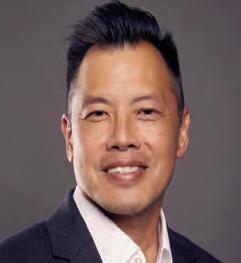

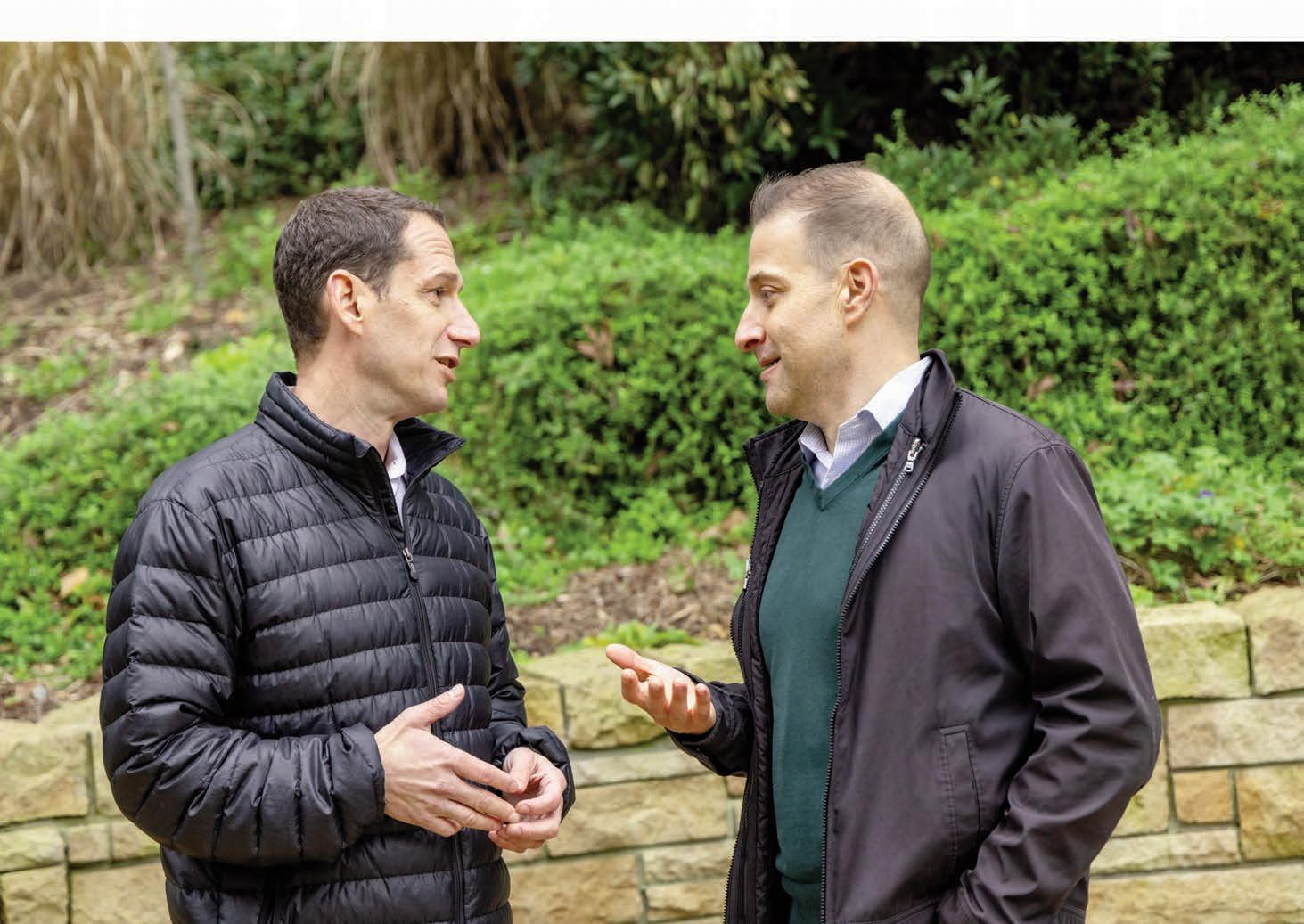
Read Daniel’s plan for change in SF or visit Daniel Lurie.com


Ad paid for by Believe in SF Lurie for Mayor 2024
Ad Committee’s Top Funders
1. Miriam ‘Mimi’ Haas ($1,000,000)
2. Jan Koum ($250,000)
3. Oleg Nodelman ($250,000)
This advertisement was not authorized by a candidate or a committee controlled by a candidate. Financial disclosures are available at sfethics.org.
Paid Political Advertisement
1 2 3 4 5
Daniel has the clearest vision on public safety, where we need to go, and the specifics on how to get there.
FMR. SFPD CMMDR. PAUL YEP Commanding Officer, Central Station
Beat generation’s Jane ‘Jae’ Whitaker dies
by Cynthia Laird
Jane Ethel “Jae” Whitaker, a Black lesbian who experienced San Francisco at the height of the Beat generation, died March 27. She was 86.
According to friends, Ms. Whitaker, known by friends as Jane or Jae, had been in declining health in recent years. A circle of close friends cared for her.
Brian Derickson, a straight ally, is one of those who helped take care of Ms. Whitaker. In an email message to the Bay Area Reporter, Derickson wrote that Ms. Whitaker was diagnosed with interstitial lung disease in 2019 and admitted to Kaiser hospice in the summer of 2023. Ms. Whitaker passed away in her States Street home in San Francisco’s LGBTQ Castro neighborhood.
Tashuana Johnson, Ms. Whitaker’s niece, told the B.A.R. that the two were very close. Johnson lives in Suffolk, Virginia, and in a phone interview, said that she traveled to San Francisco to visit her aunt.
“She loved San Francisco,” Johnson said. “She was so humble and her energy was so positive with people.”
Ms. Whitaker is perhaps best known for a 10-month romantic relationship she had with bi rock star Janis Joplin in 1963. She also rubbed shoulders with Beat greats the late gay poet Allen Ginsberg and the late City Lights Bookstore co-founder Lawrence Ferlinghetti. According to an obituary written by her friend Margaret Wilson, Ms. Whitaker also met famed musicians the late David Crosby, Stephen Stills, and Graham Nash when she helped run a club at Ocean Beach.
On July 6, 2017, Ms. Whitaker appeared at a “Living History” panel discussion at the GLBT Historical Society Museum in the heart of the Castro neighborhood. The program promoted the society’s exhibit, “Lavender-Tinted Glasses: A Groovy Gay Look at the Summer of Love,” that coincided with the 50th anniversary of the seminal season, when young people, many selfdescribed hippies, flocked to the city’s Haight-Ashbury neighborhood.
The B.A.R. noted at the time that Ms. Whitaker was met with a standing ovation at the end of the program.
“It was a special time. It all was special because I was living it. When I look back on it, it will all be special,” Ms. Whitaker said at the event.
Joey Cain, a gay man, curated that exhibit at the historical society. In an email he recalled meeting Ms. Whitaker.
“When I first contacted her while doing research for the ‘Queers in the Summer of Love’ exhibit, Jae was a bit guarded,” Cain wrote. “But she invited me over to her house and, after talking for a while, we really hit it off. She opened up and shared her memories and photos of herself and of Janis Joplin. She was so generous in letting me do the very public interview with her at the GLBT museum. We continued to talk and see each other now and then, but COVID made it more difficult, and we hadn’t been in touch for a year or two.”
Cain noted that Ms. Whitaker lived a rewarding life.
“She had such a full and creative life well beyond the short Janis affair,” he stated. “She continued to make music with others into her later years and she had a circle of friends that really cherished her. I’ll miss her lovely smile and sly wit.”
Early years
Born in Brooklyn, New York, on February 14, 1938 to Mollie Kate Weaver and Roy Pittman, Ms. Whitaker also spent her early years in Enfield, North Carolina. Her father was a sharecropper in Virginia, her friend Lillian Crist told the B.A.R. in a phone interview. Ms. Whitaker had said by the time she was 5 years old, she knew she was different. She moved from North Carolina to New York when she was 15,
the obituary noted. Michael Pittman, Johnson’s father and Ms. Whitaker’s younger brother, confirmed that she left home when she was a teen.
“Jane left home early, at the age of 15,” Johnson, who also lives in Suffolk, said via phone. “She traveled to New York, went to college, and then came to San Francisco and never left.”
After graduating from high school, she traveled across the country with a woman, eventually landing in San Francisco in the early 1960s, the B.A.R. noted in its 2017 article. Wilson’s obituary stated that the woman’s name was Pauley, though she could not remember her last name.
Queer public historian Gerard Koskovich stated that Ms. Whitaker told stories of her life as a Black lesbian.
During the historical society discussion, Ms. Whitaker talked about her memories living with Joplin, discovering Bob Dylan’s music, and brought the audience back to a time when being a Black lesbian was far from acceptable.
“Blacks were not accepted too well,” she said. “I was like a fly in the buttermilk everywhere I went, but we made it.”
Stories of segregated facilities and even attempted attacks on Ms. Whitaker were discussed. Times became even tougher when she entered a biracial relationship with Joplin after meeting her at a bar.
Ms. Whitaker said that she was often vilified for being a Black lesbian dating a white woman in those times. Because of this, Joplin herself did not accept her own bisexuality, Ms. Whitaker said during the historical society talk.
“She didn’t want anyone to know she was gay,” Ms. Whitaker said. “She wouldn’t let anyone even take our picture together.”
Joplin was performing and writing music, while Ms. Whitaker worked various jobs. The relationship eventually faded. Joplin died in 1970 of a heroin overdose at the age of 27.
Ms. Whitaker long had a love of music and played in a trio band. Ms. Whitaker was featured in the documentary, “Janis: Little Girl Blue,” which discusses Joplin’s multiple lesbian relationships.
A full life
Ms. Whitaker had a long career working as a window clerk at the U.S. Postal Service from 1962-1999, according to the obituary. She worked for much of her career at the Rincon Post Office, Wilson said in a phone interview. That’s where the two women met.
Ms. Whitaker was 22 years Wilson’s senior and Wilson looked up to her as a big sister.
Wilson, a straight ally, said the two traveled together, including on Ms. Whitaker’s first trip outside the U.S. to Costa Rica in early 2020, right before the COVID pandemic hit. At 81, she rode zip lines across the rainforest, Wilson recalled.
Wilson was part of the circle of friends who helped care for Ms. Whitaker, and she was with Ms. Whitaker on a trip to Seattle in 2019 when she first detected something might be wrong. Ms. Whitaker was walking to the Space Needle with Wilson when she had to stop to catch her breath.
In spite of her illness, which for the past year required that she be on oxygen 24/7, Ms. Whitaker remained pretty active until shortly before her passing. For many years, she and Crist would get together and play guitar, often at Ms. Whitaker’s home.
Crist, a lesbian, told the B.A.R. in a phone interview that she first met Ms. Whitaker at Wild Side West, a lesbian bar in Bernal Heights.
“She was so flirty – she would not describe herself that way, but she came on strong,” Crist recalled. “We became the best of friends over the guitar.”
They jammed at Wild Side West and, in later years, at Ms. Whitaker’s home, Crist said.
Barbara Messmore, another longtime friend and a bi woman, told the B.A.R. in a phone interview that she met Ms. Whitaker at Wild Side West when the bar was located in North Beach. “It was the primary way gays could socialize back then,” she said.
Messmore said that Ms. Whitaker “was never a big drinker.”
“She was the one who had it together,” Messmore added.
Ms. Whitaker played pool at Gino and Carlo bar in North Beach, according to the obituary. And she liked Skip’s Tavern in Bernal Heights. One day, while strolling down Cortland Avenue, Ms. Whitaker met Tito Jackson of The Jacksons who, after much conversation, invited Ms. Whitaker to a private concert he was giving at Skip’s, the obituary stated.
Ms. Whitaker took carpentry classes at O’Connell High School, the obituary noted. The result was that she was able to install beautiful wood floors in her home and did other work. Derickson noted that Ms. Whitaker was a good carpenter.
“She took tremendous pride in her own carpentry work that expanded the ‘Whitaker Mystery House’ from two to three levels,” he wrote, referring to the States Street home, where she built a beautiful staircase to the second story. “She used wood reclaimed from the post office for some of the flooring.”
The obituary also noted that Ms. Whitaker was an amateur photographer and used her old 35mm camera. She liked to take scenic shots and candid shots of individuals. She enjoyed cooking a variety of international dishes and was a generous host.
After retiring from the postal service, Ms. Whitaker worked into her late 70s as a guest services usher for the San Francisco Giants, where she assisted with wheelchairs and strollers. “Yep, retired Jae was wheel-chairing others to their seats and stacking strollers,” Wilson wrote in the obituary. She worked for the Giants from 2000 until she resigned in 2019.
“She enjoyed that and she was so well loved,” Wilson said.
Lenore Chinn, a longtime lesbian activist in San Francisco, said she visited with Ms. Whitaker last year.
“I had the good fortune of ‘inheriting’ Jae and a group of good friends of the late artist Bernice Bing (aka Bingo) and she was certainly one of the most colorful of the lot,” Chinn wrote in an email.
Messmore said that Ms. Whitaker was good friends with Bing, who eventually moved to Mendocino County on the northern California coast.
“We’d all go up there and visit Bingo,”
Memorial set for Sean Martinfield

A public memorial has been announced for Sean Martinfield, a gay man and an original San Francisco Gay Men’s Chorus member and professional singer. Mr. Martinfield died September 20, 2023 at the age of 75.

Jane

Jane
Whitaker,
Messmore said.
Derickson noted that Ms. Whitaker “was laughing and singing with her friends until the week of her death.”
“She was a lioness, loved by many,” he added. “We spoke everyday from COVID onset in 2020 until the day she passed. I miss her terribly.”
Derickson and Wilson were with Ms. Whitaker on March 27. Wilson told her to smile and stated in the obituary that she and Derickson witnessed “the most beautiful smile ever.”
After Wilson stepped out the door, Derickson said that Ms. Whitaker slipped away quietly and peacefully at around 4:55 p.m.
Ms. Whitaker was predeceased by her parents, as well as a brother, Roy Pittman Jr. (His wife, Delores, survives him.) In addition to her brother Michael Pittman, she is survived by her siblings, Bishop Marjorie Ruffin,
For more on Mr. Martinfield’s life, see the obituary that ran in the Bay Area Reporter.
Michael Alan Moser
October 16, 1963 – March 23, 2024
a
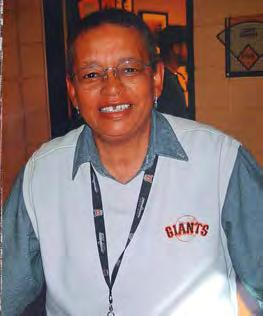
Jane “Jae” Whitaker worked as an usher at San Francisco Giants games.
Friends have announced that a public memorial will be held Sunday, May 5, from 11 a.m. to noon at the Chan National Queer Arts Center, the chorus’ home at 170 Valencia Street. According to a flyer, there will be honors from members of the chorus and the San Francisco Lesbian/ Gay Freedom Band, the official band of San Francisco.

Michael Alan Moser, 60, of Key West, Florida, passed away on March 23, 2024 after a cardiac event.
He was born in Salt Lake City, Utah on October 16, 1963 to William and JoAnn Moser. He is survived by his husband, Thomas Masat, in Key West and his sister, Lyndia Gray, and brothers Gary and Tom in Salt Lake City. He will be missed by his family and friends.
Following the memorial, there will be a celebration of life reception up the street at Martuni’s Piano Bar, 4 Valencia Street (at Market Street). The reception will include special performances, hors d’oeuvres, and an open piano bar. A native San Franciscan, Mr. Martinfield was a professional singer for over 20 years and private vocal coach for more than 35.
Mike spent over three decades as an IT manager at the National Parks Conservancy in San Francisco. In 2008, Mike married Thomas in San Francisco. Their wedding theme was “Pure Imagination,” inspired by Dr. Seuss and Willie Wonka. “Make a wish Count to three Come with me and you’ll be
In a world of pure imagination.” With this wish in mind, Mike and Thomas created a life filled with dogs, adventures, and magic. Mike was smart, witty, and loving. In 2020, Mike and family moved to Key West where he retired. He was a gifted writer and poet, active volunteer, occasional Buddhist, and ambivalent yoga practitioner. His secret power was his quiet charm and wicked humor. He was also the designated wrestler for their dog, Henry. He was, and is, the love of Thomas’ life.
A celebration of life will take place in Key West in the fall. In lieu of flowers, the family requests donations be made to recovery club Anchors Aweigh, 404 Virginia Street, Key West, Florida, 33040. Obituaries
Correction
The April 11 obituary “Groundbreaking fetish artist Rex dies” inaccurately stated that Jack Fritscher was the publisher of the old Drummer magazine. Fritscher served as an editor in chief for the publication. The online version has been updated.
8 • Bay area reporter • April 18-24, 2024 t
Wildon Long, Jesse Pittman (Yvonne), a host of nieces and nephews, and her godson, Jason Lee. t
<< Obituaries
>>
Courtesy Margaret Wilson
“Jae” Whitaker sat in front of photos of herself and Janis Joplin during a “Living History” panel discussion at the GLBT Historical Society Museum in 2017 that commemorated the 1967 Summer of Love in San Francisco.
Gerard Koskovich
“Jae”
left, shared
laugh with Joey Cain, curator of the GLBT Historical Society’s “Lavender-Tinted Glasses: A Groovy Gay Look at the Summer of Love” exhibition, during a 2017 panel discussion at the archival group’s museum.
Jane Philomen Cleland
by Gwendolyn Ann Smith
There are three stories that have recently crossed my desk, each of which are unrelated, but together paint a very descriptive image of what’s wrong with the way non-trans people are speaking about trans lives.
First, the North Dakota Republican Party asked its members to vote on 15 resolutions during its convention, with all but a proposed push for criminal penalties for women who get abortions passing. The other 14 covered a wide array of topics, from fighting against the use of eminent domain for carbon capture to demanding the United States withdraw from the United Nations.
The resolution that caught my eye was neither of those, but one that opposed adding sexual orientation and gender identity as a protected class within the Peace Garden State. Of particular note was the party’s language aimed at transgender and nonbinary people.
“The North Dakota Republican Party advocates an affirming approach to biological identity and supports the restoration of gender dysphoric individuals, that they may embrace and be comfortable with their natural biological state,” the resolution read.
Let’s sit with that for a moment, and focus a hemisphere away, from North Dakota to Vatican City in Rome.
After a few years of somewhat positive news, including a statement that transgender people could be baptized “under certain conditions,” the Roman Catholic Dicastery for the Doctrine of the Faith released “Dignitas Infinita” (Infinite Dignity). The 20-page document spelled out the Catholic Church’s stance on “gender theory,” declaring that to be transgender is to try to “make oneself God.”
As you can guess, the church prefers to keep who is and isn’t a deity firmly in its own hands.
“It follows that any sex-change intervention, as a rule, risks threatening the unique dignity the person has received from the moment of conception,” the declaration stated.
Finally, a visit to jolly old England, where a review was commissioned with a goal of improving gender identity services under the National Health Service. The report is widely known as the Cass report, from the name of its author, Dr. Hilary Cass.
Rather than looking to improve transgender care in the U.K., and in spite of wide criticisms about impossible wait times and substandard treatment, the report instead calls for even more restrictions on gender-affirming care for transgender people under the age of 25, but stops short of a complete ban on such services.
It also suggests that conversion therapy may be a viable option for transgender people, and even expects one to see a clinician before even undergoing social transition. Conversion therapy, which attempts to change a person’s sexual orientation or gender identity, has been widely debunked by numerous professional medical associations.
In the report, Cass claims that people are somehow “influenced” into being transgender, and that being transgender itself may cause anxiety and depression. It also dismissed 98% of the exist-

ing studies on transgender health care as invalid, simply because they weren’t “double-blinded.” Never mind that doing so would be ethically impossible to carry out. (A double-blind study is one in which neither the participants nor the researcher knows which treatment participants are receiving until after the clinical trial is over.)
It is obvious that each of the above examples is about transgender people, but I also want to point out the obvious issue with them all: it is clear that there is not a
trans voice in any of them.
The Cass report is obvious. Not only did Cass dismiss any report that shows how trans care has positively affected ac tual transgender people, but she did not even bother to include trans voices in the report. The voices of transgender youth – the very people she was seeking to help, supposedly – were tossed out for being somehow
“biased” in discussing their own care.
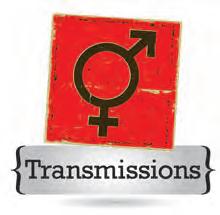
If Cass had listened, the argument of “influence” would fall away, let alone the notion that being trans itself leads to depression and anxiety: it’s not being trans that does that, it is how we, as transgender people, are treated by society.
Likewise, “Dignitas Infinita” talks a lot about dignity – it is right there in the title – all
Folsom Streetscape Project
the while it denies transgender people their own dignity in the eyes of their God. We’re not seeking to be their God; we just want to be allowed to be human. They couch us as some sort of “theory,” when we are flesh and blood. Once again, we’re humans, we walk among you. You can talk to us. Yet, rather than seeing our dignity and, yes, the spark of the divine that they might otherwise claim to possess, they treat us as undig-

In support of The San Francisco Municipal Transportation Agency (SFMTA) to improve safety and access for people walking, bicycling, and taking public transit, the Folsom Streetscape Project aims to increase traffic, pedestrian, and bike safety on Folsom Street from 2nd to 11th streets.
Folsom Street is part of San Francisco’s Vision Zero High Injury Network. This means that Folsom is part of the 12% of streets in San Francisco that receive 68% of the city’s severe traffic injuries and fatalities.
Construction is anticipated to begin in May 2024. Two community events are scheduled for April 27 and May 2. Come learn more and subscribe for updates at SFMTA.com/FolsomHoward
The Folsom Streetscape Project will improve Folsom from 2nd to 11th streets with design elements that include:
• Two-way Bikeway
• Resurface Roadway

April 18-24, 2024 • Bay area reporter • 9 t Learn About Wider Sidewalks, A Two-Way Bikeway and More Coming to Folsom Street! SFMTA.com/FolsomHoward 311 Free language assistance / 免費語言協助 / Ayuda gratis con el idioma / Бесплатная помощь переводчиков / Trợ giúp Thông dịch Miễn phí / Assistance linguistique gratuite / 無料の言語支援 / Libreng tulong para sa wikang Filipino / 무료 언어 지원
• New Transit Boarding Islands
• Street and Pedestrian Lighting • Trees + Additional Landscaping
Commentary>>
Smith See page 10 >>
Embracing trans dignity
Christine
Escalon died of an overdose of amyl nitrates and gamma-hydroxybutyric acid, or GHB, according to the medical examiner’s report. He was found dead by his roommates, and Rickleffs was arrested September 12, 2012 in possession of the suitcase.
During his first trial, San Francisco Deputy Public Defender Niki Solis, a lesbian, argued that the death, though unfortunate, was the result of consensual BDSM sex and discussed Escalon’s alleged interest in drugs and BDSM sex, a defense the victim’s mother, Esmeralda Escalon, said at the time was inappropriate and inaccurate.
In a group discussion with Cervantes, who prosecuted the case originally, and Solis outside the courtroom after the 2019 verdict, the jury explained their reasoning behind their decision. Most said that they felt Escalon’s death was caused by many factors, including the obstruction of his breathing from the gag, his inability to move from being bound, and the drugs found in his system.
<< LGBTQ shelter
From page 1
The hotel rooms were funded by the Federal Emergency Management Agency through September 2021, and the city planned to stop using the hotel by January 21, 2022.
When asked about the six-month gap, Pina told the B.A.R., “We opened the shelter only when we got authorization from the Department of Homelessness and Supportive Services and when DPH had clear protocols to reopen congregate shelters.”
“This was a process that lasted probably a whole year in the city,” he added. DPH declined a request for comment, referring the paper to HSH, which the
The event is being hosted by the Downtown SF Partnership, which is supported by Mayor London Breed and the Office of Economic and Workforce Development. Create will pay tribute to the origins of the historic Montgomery Block building and surrounding downtown area, a news release stated.
The Montgomery Block building was a historic building active from 1853-1959.
The building was demolished and the Transamerica Pyramid building now sits there.
They did say, however, that although they unanimously agreed that Rickleffs did not intend to kill Escalon, it was the robbery and disregard for human life that swayed them to find him guilty of felony murder.
The fifth division of the state’s 1st District Court of Appeal ruled October 24, 2023 – in an opinion written by Justice Mark B. Simons – that “appellant’s murder conviction is reversed, although the People may accept a reduction of the conviction to involuntary manslaughter. Appellant’s conviction of robbery is reversed, although the People may accept a reduction of the conviction to petty theft.”
The appellate court panel gave several reasons for its decision. For one, a California Supreme Court ruling in People v. Brown (2023) threw out the very jury instructions for a murder by poison charge that were used in Rickleffs’ case.
Simons also questioned the forensic evidence presented at trial – including an NMS Labs report.
“The only evidence of the levels of nitrate and GHB in Escalon’s system
B.A.R. also contacted.
“The city along with our partner, Dolores Street Community Services, is committed to the capabilities and cultural capacity of Jazzie’s Place in our Homelessness Response System,” an HSH spokesperson stated via email. “These important services are critical to the queer and trans community we serve.
“Creating a safe space is a priority and Jazzie’s Place reopened following the pandemic in June 2022 with 14 beds in accordance with DPH guidelines,” the spokesperson continued. “Dolores Shelter Program reinflated their shelter beds to pre-COVID capacity starting in November 2023. They are currently operating Jazzie’s with a capacity of 24 beds to serve lesbian, gay, bisexual, and
attendees can interact with the public realm in new, delightful ways.”
Silver added that the partnership is dedicated to “bringing the resilient imagination and wonder of downtown to life.”
The past will honor 1924 and include the Poetry Store, where poet Silvi Alcivar will create poems on-demand in three minutes or less; the Lords of Print screenshop; pianist Richelle Scales; and bandleader Jae Jackson.
The present will honor 2024 and feature dance from MotoR/dance; vocalist Jackie Chavez; and musician Aidan Moore.
came from a report created by a Pennsylvania laboratory, NMS Labs, which processed samples provided by the medical examiner’s office,” the ruling states. “The NMS Labs report did not include any raw data, but just listed the results of the testing performed. [Luke] Rodda, the prosecution’s toxicology expert, could not independently reach a conclusion about the levels of nitrate and GHB, but instead relied solely on the levels identified in the NMS Labs report. No one from NMS Labs testified at trial.”
Continued Simons, “Absent evidence from the NMS Labs report that Escalon consumed a significant amount of drugs, there is a reasonable probability the jury would have found appellant’s acts of binding, gagging, and leaving Escalon did not demonstrate conscious disregard, but rather only satisfied the lower standard for involuntary manslaughter.” Simons also stated that the instructions on the robbery charge were also wrong because Escalon rendered himself unable to resist.
“Whether Escalon tied himself up
transgender homeless adults seeking shelter beds.”
Referral partners to DSCS include the San Francisco LGBT Community Center, El/La Para TransLatinas, and the TGIJP Black Trans Cultural Center. Mission Neighborhood Resource Center also still refers people, though not at the same rate as prior to the pandemic, Pina stated.
Sofía S. Ríos Dorantes, deputy director of El/La Para TransLatinas, stated to the B.A.R. that “Jazzie’s Place has reopened, and we are excited to be their referral partner.”
“Referrals are going well and we are always looking to connect individuals in need with the resources and support that Jazzie’s Place provides,” she stated.
... or whether appellant tied him up at his request, Escalon would have knowingly and willingly taken action to render himself unable to resist,” Simons stated. “In either instance, his resistance would not have been overcome ... without the voluntary cooperation of the subject whose resistance is repressed. ... We thus agree with appellant that the force required for a robbery must be non-consensual and the court erred in failing to so instruct the jury.”
Simons was joined in the opinion by Justices Gordon Burns and Danny Chou.
A February letter from the B.A.R. to Rickleffs seeking comment was returned last month, with the U.S. Postal Service stating it had been sent to an incorrect address. A B.A.R. reporter told Helvestine Monday the newspaper would be interested in speaking with Rickleffs and had questions for him. Helvestine said he’d tell Rickleffs and return comment to the B.A.R. Escalon and Tiscareno did not talk during the Zoom call. After court, Escalon declined to comment until the trial.
“People interested in making a referral or finding out more information can inquire directly with Jazzie’s Place through their website.”
The LGBT center and TGIJP Black Trans Cultural Center did not return messages seeking comment.
People who are unhoused and in need of shelter “can go directly to any of our referral partners and ask for shelter and they will refer them to us,” Pina stated.
Jazzie’s Place is one component of DSCS’ broader Dolores Shelter program, and is housed in the same location. For 42 years the nonprofit has offered “overnight shelter, hot meals, and support services to adults experiencing homelessness,” according to DSCS’ website.
“Case management services are of-
Tiscareno stated, “Obviously, we are sad that we have to go back to trial and relive this all over again.”
“It’s taken a long time to heal the wounds that were caused during the previous decade-long trial,” Tiscareno stated. “Here we are again going through the motions and unsure of where this next trial takes us.
“It’s disappointing to us that the defendant recently delayed the trial to try and hire his own attorney, but only for us to learn that he was unsuccessful,” Tiscareno added. “It reminds me of the delay tactics the previous public defender used to advance her own career while the family and friends of Eriq Escalon were simply trying to find answers to how and why he was murdered. And just because we have answers to those previous questions, it’s not going to make this case any easier.
“We are grateful for the support of the San Francisco District Attorney’s office and wanted to thank [DA] Brooke Jenkins and Julia Cervantes for their continued commitment towards fighting for our Eriq,” he stated. t
fered onsite to support guests with finding additional support and resources related to housing, benefits, and physical and mental health,” the website continues, referring to the Dolores shelter program.
The shelter beds geared toward the general public open daily from 6 p.m. to 8 a.m. According to the nonprofit, it accepts walk-up guests “on a first-come, first-served basis. Shelter doors open at 6 p.m. and guests can begin lining up no sooner than 5:30 p.m.”
The LGBTQ-focused shelter is named in honor of the late Jazzie Collins, a transgender woman who advocated for housing, seniors, and other issues and died in 2013. It first opened in 2015. t
“Create is a true and necessary investment into downtown San Francisco’s art scene,” stated Robbie Silver, a bi man who’s executive director of the Downtown SF Partnership. “By hosting a diverse set of performances and creators that invite public participation and highlight the area’s existing cultural offerings,
The future will take a look at 3024 and include music spun by a DJ using a playlist sequence generated by artificial intelligence, and “A Robot Made It First,” a tactile art experience for people with any level of vision capability.
<< Transmissions
From page 9
nified at best – and something bordering on heresy at worst.
And then there is the North Dakota GOP.
For more information about Create, go to downtownsf.org/things-to-do/ create.
Larkin Street Youth Services marks 40 years
Larkin Street Youth Services will mark its 40th anniversary with its 22nd annual Paving the Way gala Saturday, April 27, from 6 to 9:30 p.m. at the Four Seasons Hotel, 757 Market Street in San Francisco.
The event will honor Maryann Muduroglu, San Francisco’s chief of protocol, with the nonprofit’s Anne B. Stanton Award for her pivotal role in the success of Larkin Street’s Rising Up campaign, a public-private partnership launched in 2019 with the city of San Francisco that is aimed at reducing youth homelessness. A news release stated that with Muduroglu’s efforts, which included leveraging her network, the campaign helped 641 young people find a pathway out of homelessness.
from Larkin Street’s programs will be recognized with the annual Going the Distance Awards for their significant progress toward overcoming homelessness.
Businessman and internet personality Nick Cho will emcee the event alongside Larkin Street program participant Averaii Dirks, the release noted.
The event includes a reception, silent and live auctions, seated dinner, and awards program. Tickets are $500. For more information and to purchase tickets, go to https://tinyurl. com/4muzamdt.
Learn how to declutter at SF seminar
Matt Paxton, author, organizational guru, and host of PBS’ “Legacy List,” will appear at a seminar to discuss how people can downsize and declutter
Additionally, three young people
Thursday, April 25, from 2 to 4 p.m. at
The Sequoias San Francisco, a senior living community located at 1400 Geary Boulevard.
According to a news release, Paxton helps people discover how personal belongings hold a wealth of memories. Items with a high sentimental value can hold people back from decluttering and downsizing. Paxton teaches attendees how to curate items and share their legacy through these meaningful possessions.
“An abundance of personal belongings can be challenging as you age,” Paxton stated. “But when it comes to downsizing, it’s easier to keep the memories and lose the stuff.”
Following the presentation, appetizers and drinks will be served. Attendees can meet residents of The Sequoias and hear stories behind their legacy items. The event is free but registration is required due to limited space. To sign up, go to sequoialiving.org/matt. t << News Briefs From page 3
We don’t need much prompting to know the Republican Party’s stance on transgender people. The party has been making it clear, in words and action, that it would rather see transgender people eradicated, even as it, too, tries to hide behind phrases like “gender ideology,” or “pronouns,” or whatnot.
From page 2
Even more so than in his on air segments, Vigliotti is front and center throughout the book, talking to readers in the first person.
“I wasn’t sure how much of my own experience would be a part of this book. It documents my education and my understanding of the role climate change is having,” he said. “I felt like if I was going to invite readers into my world, I needed to be as honest as possible in those moments where I am sharing my personal experiences.”
Professionally, Vigliotti said he “never actively” hid being gay. But as he explains in the book, he routinely was “straightening out my gay” when sent to report in places like the Middle East.
An assistant news director at the Milwaukee TV station where he once worked advised him to “rein in the fagginess,” he writes. He also disclosed losing a network job “because the main anchor at the time didn’t like the way I ‘tracked.’”
Vigliotti told the B.A.R. he publicly came out in either 2011 or 2012. He credited gay CNN anchor Anderson Cooper, who is also a cor-
This is my “natural biological state.”
In spite of the fact that my biology is distinctly different from what North Dakota Republicans may be expecting after three decades of medical intervention of one sort or another, I also know that I am exactly who I always knew I was, from about age 3
To that end, I want to note the one thing that bothers me the most about the North Dakota GOP’s statement. It seems to want me, and other trans people, to “embrace and be comfortable with their natural biological state.”
respondent for CBS News’ “60 Minutes” newsmagazine, for giving him the courage to do so.
“The role I think he had in giving a voice to other journalists who were also quote-unquote closeted ... I don’t know him personally but I am forever grateful for that,” said Vigliotti. “It gave me a way forward and a way to be more authentic as myself and more transparent without having to hide parts of myself.”
Doing so in his book marked a departure from his usual reporting focus.
“I have always believed as a journalist my role is to disappear into the
onward. I am indeed embracing, and comfortable with, who I happen to be, and if any of them had bothered to talk to a transgender person, maybe they would have the slightest glimmer of that.
No amount of conversion therapy, no amount of repression, and no number of ridiculous reports, dirtiness, or resolutions can change who a
background and to give a platform to the people I am interviewing. I always naturally shied away from sharing too much of myself to begin with,” said Vigliotti. To not reveal his own story in his book would have been a disservice to his interview subjects, he reasoned.
“I have come to expect so much from people who are often sharing the worst moments of their life with me. I felt it would be a hindrance to not return that favor,” said Vigliotti, who is at work on expanding his nightly news broadcast’s coverage of small-town America.
transgender person is – and we expect that to be honored.
That’s our dignity speaking, and Republicans, the Vatican, and a British physician aren’t allowed to write it off. t
Gwen Smith never became transgender, she just is. You can find her at www.gwensmith.com
The book doesn’t mark an end to his coverage of natural disasters. He plans to continue heeding the call when such assignments break. “I do love California and do find a sense of purpose covering these kinds of stories,” said Vigliotti, who lives in Hollywood. “I will continue covering extreme weather events.” t
As of now Vigliotti doesn’t have any book readings or signings scheduled for the Bay Area. The book can be purchased online at
10 • Bay area reporter • April 18-24, 2024 t << Community News
<< Rickleffs From page 1
CBS
https://tinyurl.com/stndp3ay <<
reporter
 by Jim Gladstone
by Jim Gladstone
he Tutor” is torrid.
Now being staged in a provocative, fiercely entertaining world premiere production commissioned by New Conservatory Theater Center and mounted in collaboration with Golden Thread Productions, Torange Yeghiazarian’s hardly mellow drama plays with a love triangle as sharp and spiky as the dagger-like points on a backgammon board.
Set designer Matt Owen’s audience-surrounded central stage design is decorated to evoke that pastime, which has origins in ancient Persia. And Yeghiazarian’s erotic troika of contemporary Iranian and Iranian-American characters play the game, even as they engage in more dangerous competitions.
Longtime friends Kayvon (Lawrence Radecker) and Azar (Déborah Eliezer), are in their early fifties; he’s a successful tech executive, she’s a Berkeley math professor who has struggled with workplace gender politics but recently earned tenure. They seem to have met as immigrant undergraduates in the 1980s, having left Iran in the early years of its becoming an Islamic republic.
The third character, Baran (Maya Nazzal), is a 25-year-old Gen Z firebrand. She’s a proud lesbian whose activism in Tehran had placed her, and her family, in danger. She’s also newly wedded to the well-intentioned, ill-informed Kayvon, thanks to a deal brokered by their old-school mothers.
Criss-crossed passions
The couple’s motives for betrothal are distinctly different.
Baran is set on a merry, merciless path to
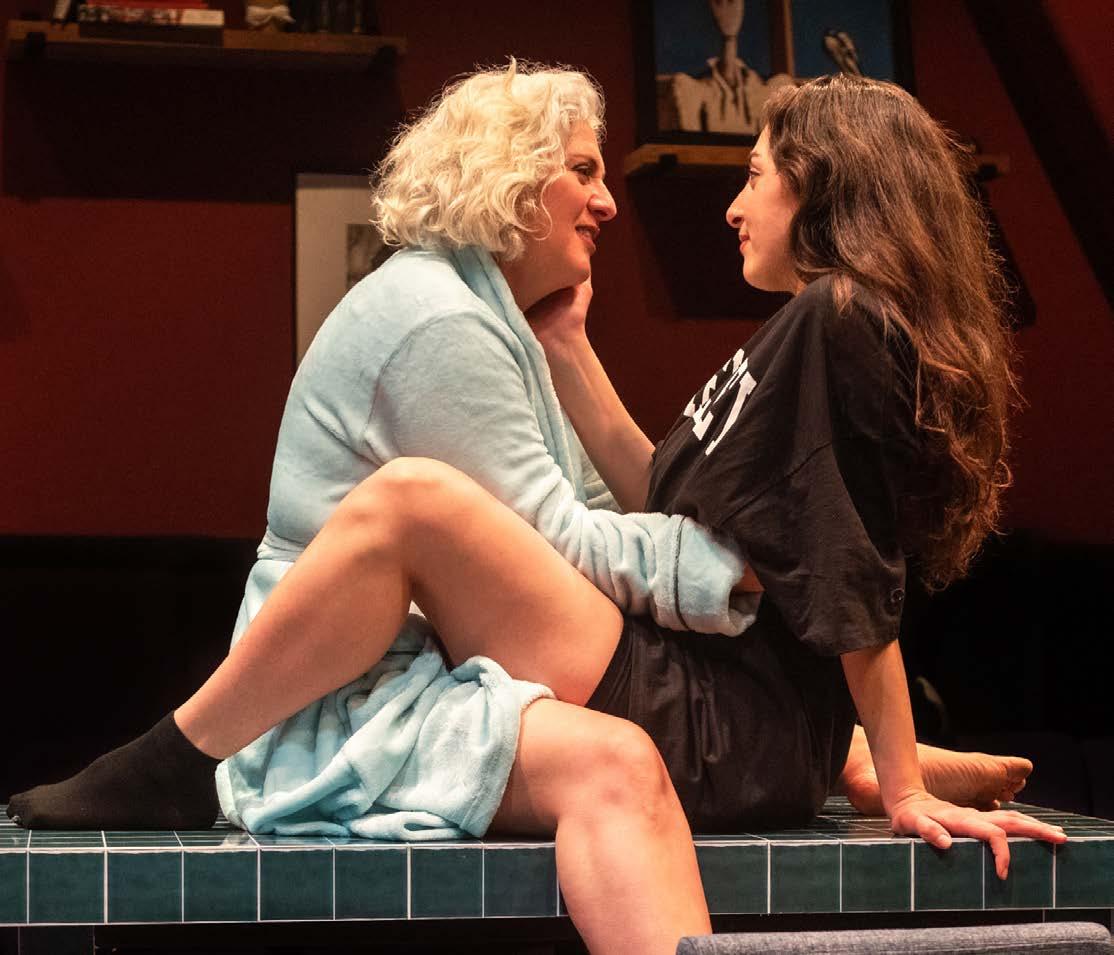
freedom and a green card. In a scene set during a memorial for her mother-in-law, we see her crawling under a kitchen table to perform oral sex on Azar, with whom she’s begun a secret affair. As Kayvon attends to guests in the next room, his young wife and best friend are stretching their clingy black mourning dresses in ecstasy.
Kayvon’s own willingness to enter an arranged marriage may, as he insists, stem from a desire to appease his sickly matriarch. But it’s also
‘The Tutor’
because he’s floundered at romance. He falls back on what he imagines will be the once-upon-atime ease of antiquated tradition rather than continue to struggle with the modern dating game.
As in backgammon, Kayvon moves backwards seeking home.
This devilish interweaving of male fragility and cultural heritage is just one of many stratagems Yeghiazarian (who was Golden Thread’s founding Artistic Director) employs in engaging

‘Japanese Prints in Transition’
Classics and contemporaries at the Legion of Honor
by Robert Brokl
The lavish new exhibit, “Japanese Prints in Transition,” at the Legion of Honor, is as welcome as spring. Karen Breuer, former Curator in Charge at the Achenbach Foundation, Fine Arts Museums of San Francisco, organized the exhibit with a handsome catalog from more than 3,000 prints in the collection.
The exhibit spans the earliest prints to works by artists competing with photography in the early 20th century, as well as the little-known Yokohoma school artists, who flourished after the “gunboat diplomacy” of Commodore Perry pried open Japan to westerners, after 220 years of isolation. The Yokohama artists depict the exotic westerners, and their strange hair and dress, with humorous or gimlet-eyed views.
“Japanese Prints in Transition” is perhaps a revisionist critique of the 2010 FAMSF exhibit “Japanesque: The Japanese Print in the Era of Impressionism, ” which featured prints as source material for western artists like Van Gogh and Gauguin. Art movements like Post-Impressionism and Art Nouveau all borrowed from the stylistic innovations of the prints, an influence labelled Japonisme or Orientalism.
Despite being works on paper, and created in a collaborative process involving artist/designer, carver, printer, and publisher, the bold compositions of Katsushika Hokusai rival Picasso’s, Utagawa Hiroshige’s sublime “rightness” evokes Matisse, and Tsukioka Yoshitoshi combines Goya’s depths with the lushness of Fassbinder films.
Marquee stars
Utamaro, Hokusai, Hiroshige
The exhibit begins with the early viewings of women in a variety of poses in interior settings by Kitagawa Utamaro, with muted vegetable dye colors. The actor prints are more lively, depicting the social milieu of Edo (modern-day Tokyo) in the shogunate period. A rigid class structure was imposed by the shogunate, with merchants at the bottom, who were allowed to spend freely upon Kabuki theater, drinking, dining, and geishas, in the Yoshiwara District, where brothels were licensed. The term, Ukiyo or Floating World, described the transience of such pleasures, “Ukiyo-e” meaning pictures of the floating world, in which falling cherry blossoms are a metaphor for time passing.
Like Shakespeare’s plays in the Elizabethan era, all the Kabuki roles were played by men, acting off limits to women except very early on. The female roles were played by pre-pubescent boys;
in 1652 these roles were taken by men with their forelocks shaved, a signifier of maturity. Homosexuality likely existed among the male actors, but lines blurred.
Landscape emerges as a theme in works by Hokusai. He used the newly synthesized Prussian Blue in “Thirty-Six Views of Mt. Fuji,” and “Great Wave” and “Fuji in Clear Weather” deserve their iconic status. Hiroshige followed with his series, “Fifty-Three Stations of the Takaido” and “One Hundred Views of Famous Places in Edo,”
the audience. She encourages the shifting of our allegiances among the characters as their own loyalties slalom in a switchback course. The betrayals and reversals are multifold and emotionally perilous.
All three cast members turn in terrific performances, allowing us to see them subtly blinking in bafflement, openly throbbing with pheremon-
See
which innovate unusual vantage points, and dramatic depictions of wind and rain that Van Gogh copied. Hiroshige was successful in his day with “pastoral views for city dwellers,” depictions of a vanishing world.
Other themes exploit representations of warriors, battles, and myths, as with Utagawa Kunioyoshi’s fantastical “At the Bottom of the Sea in Daimotsu Bay.” But the giant, and student of Kuniyoshi, who arrived on the scene was Tsukioka Yoshitoshi (1839-1892).
Yoshitoshi revival
The myopic view that important Japanese printmaking ended with Hiroshige was upended by the 1980-82 exhibition, “The Bizarre Imagery of Yoshitoshi,” which appeared in several major venues, including FAMSF, with a catalog by Roger Keyes and George Kuwayama.
Kuwayama wrote: “A reevaluation began in the late 1960s, and today he is admired along with Kiyochika and Kunichika as one of the three leading Ukiyo-e artists of the Meiji period… Deeply introspective and for periods mentally ill, he often seems to reveal his inner torment in his work. His work delved into realms that appeal to modern audiences: themes dealing with the occult, with demonic violence, sexual sadism, and hallucinatory imagery.”
Turmoil that resulted from the opening to the West was reflected in prints depicting violence, murder, and lust. Yoshitoshi’s dismal sales history benefited from the turmoil. He began turning out prints for newspapers, shinbun-e. The drama was enhanced by the introduction of coal tar dyes,
See page 16 >>
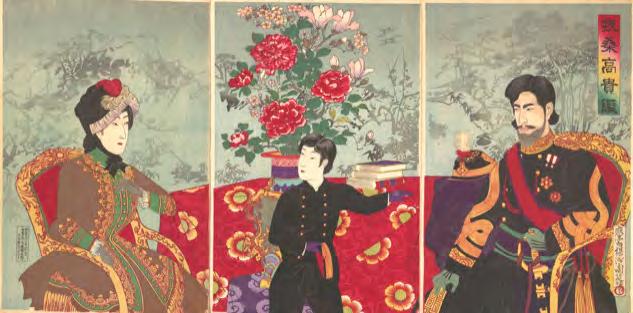 Debórah Eliezer and Maya Nazzal in ‘The Tutor’
Passion play’s penetrating perspectives at NCTC
Debórah Eliezer and Maya Nazzal in ‘The Tutor’
Passion play’s penetrating perspectives at NCTC
Lois Tema
Tsukioka Yoshitoshi (1839–1892)
‘Fujiwara no Yasumasa Playing a Flute by Moonlight,’ 1883 (partial view)
courtesy FAMSF
page 15 >>
“T
courtesy FAMSF
Yōshū Chikanobu’s ‘A Mirror of Japan’s Nobility,’ 1887.
 by David-Elijah Nahmod
by David-Elijah Nahmod
Primetime soap operas like “Dynasty” are fondly remembered by gay men of a certain age. It’s sometimes hard to believe that nearly four decades have passed since Krystle (Linda Evans) and Alexis (Joan Collins) engaged in some of the most brutal, knockout, drag-out fights the small screen has ever seen, all while impeccably dressed in stunning gowns and jewels. And even though they often slapped each other silly, not a strand of
hair was ever out of place.
In 2017, Oasis staged “Bitch Slap!,” a live-on stage homage to “Dynasty” with a touch of “Days of Our Lives” and novelist Jackie Collins thrown in for good measure. “Bitch Slap!” proved to be so popular that Oasis is doing it again.
From April 25 until May 18, “Bitch Slap!” will grace the Oasis stage, starring San Francisco Drag Laureate D’Arcy Drollinger and a bevy of other local drag talents, including Matthew Martin, Katya Smirnoff-Skyy, and Valentine, with Michael Phillis, Man-
uel Caneri, Pablo Escobar, and Samuel Prince as the smoldering leading men.
“It’s a tour-de-force in terms of performers that have faced the Oasis stage over the years,” Drollinger, who also serves as the show’s writer and director, said in an interview with the Bay Area Reporter. “Each one a star in their own right.”
 by Jim Provenzano
by Jim Provenzano
After years of delays and lots of fundraising, the new Stud bar hosted a soft opening on April 12 in advance of its grand opening on April 20. The new venue, the former Julie’s Supper Club on 1123 Folsom Street, includes two bars, a dance floor and many events to come.
Some of the historic Stud memorabilia from the old bar on Harrison and Ninth streets was put up, along with more to come. The event was also a fundraiser for the local news, arts and nightlife website 48hills.com, and a belated birthday party for publisher and Stud Collective member Marke Bieschke. Don’t miss the grand opening on April 20.t
www.studsf.com






The show will certainly live up to its title, as all the elements that made shows like “Dynasty” so popular will be on display. Adultery, blackmail, confessions, amnesia, nervous breakdowns, bigamy, adoptions, divorce, kidnapped babies, evil twins, seductions, shoulder pads and catfights.
“There are 58 individual slaps and four fights,” said Drollinger. “Audiences will not be disappointed.”
Drollinger spoke briefly about why shows like “Dynasty” garnered such a huge fan base among gay men.
“I think gay men love flamboyant women to be sure,” he said. “And ‘Dynasty’ delivers, but ‘Dynasty’ also had a lead character come out on primetime TV in the ’80s. It was groundbreaking.”
While keeping up with his intense Oasis schedule, Drollinger is also enjoying his work as San Francisco Drag Laureate.
“It’s been a wild ride,” he said. “And I’m here for it. The Drag Laureate appointment has been a bigger responsibility than I had originally expected, but at the same time incredibly rewarding. I’m nearing my midway point and there is so much more I hope to accomplish.”
Drollinger is delighted that drag has become as big as it is now, though, as he points out, everything old is new again.
“We’ve had drag since Shakespeare,” he said. “We had Milton Berle and Flip Wilson in drag on TV in the ‘60s. But I didn’t think queer drag, the drag that came out of our communities, would have become as accessible as it is now.
Clearly ‘Drag Race’ had a big hand in it.”
Post Drag Laureate, Drollinger has big plans for “Bitch Slap!”
“My goal is to develop ‘Bitch Slap!’ into a TV show,” he said. “Netflix, are you listening? I think the world is ready for a high camp ’80s drag soap, where instead of fighting over oil they are fighting over the shoulder pads patent. I think it could run for many seasons with guest stars from both the drag world and the soap world.”t
‘Bitch Slap!’ April 25-May 18,




Oasis, 298 11th Street, $40-$75. www.sfoasis.com 14 • Bay area reporter • April 18-24, 2024 ‘Bitch Slap!’ ‘Dynasty’ in drag at Oasis t << Drag & Rebirth 415-255-8207
of Laughter and Four-Part Harmony! April 18-May 5 GATEWAY THEATRE WRITTEN BY STUART ROSS MUSICAL CONTINUITY, SUPERVISION, AND ARRANGEMENTS BY JAMES RAITT DIRECTION AND MUSIC DIRECTION BY DANIEL THOMAS
42ndstmoon.org Full
The Stud’s soft opening
The cast of the 2017 production of ‘Bitch Slap!’ Gooch
D’Arcy Drollinger and Matthew Martin in a promo photo for ‘Bitch Slap!’
‘Forever Plaid’
by David-Elijah Nahmod
Ashow that begins with the deaths of its lead characters might not seem like a fun evening at the theater, but that’s exactly how “Forever Plaid” begins. The off-Broadway musical revue tells the story of The Plaids, a quartet of high school pals who dream of emulating their favorite 1950s guy groups like The Four Aces and The Four Freshmen. But on their way to their first gig, The Plaids are killed in a car wreck. But this doesn’t stop them from pursuing their dreams. The Plaids return from the afterlife for one final stab at musical glory.
From April 18 to May 5, San Francisco’s beloved musical theater company 42nd Street Moon will stage a revival of the 1989 play at the Gateway Theater. This new production falls under the direction of Daniel Thomas, whose association with the show dates back to 2000 when he first played Jinx, one of the Plaids. Since then, Thomas has played Jinx in seven additional productions and has directed the show twice.
“For 42nd Street Moon, we were looking for shows about community and found family,” Thomas said in an interview with the Bay Area Reporter. “The guys in ‘Forever Plaid’ found those things in their shared love of music and singing. You can see that they were not the popular guys in high school. They’re awkward, they’re insecure, and you get hints that their home lives are not ideal. But you can see the love and friendship they share with each other, and that makes the show sweet and even poignant, while being hilarious.”
Thomas added that the deaths of the lead characters is treated with a light touch so that the audience doesn’t dwell on it. As the show progresses, the audience is likely to realize that their dying is a metaphor for life passages.
“It’s the reaching for dreams,” he said. “The struggles of not reaching
Pitch-perfect melodies from beyond the grave

them, and eventually realizing that the accomplishments you do reach may very well be enough, and may even be more fulfilling.”
More music
The major selling point of “Forever Plaid” is the music. The Plaids perform four-part harmonies of classic 1950s tunes like “Love Is a Many Splendored Thing,” “Three Coins in the Fountain,” and “16 Tons.” We asked Thomas about marketing this style of music in today’s Taylor Swift/Beyoncé market.
“I think popular music has spread out to the point where younger audiences can embrace all styles of music,” he said. “Beyoncé can do a country album, Taylor Swift can glide between genres, artists like Ed Sheeran and Josh Groban have revived some of that crooning sound of the mid-20th century. And even though showtunes don’t crack the charts like they used to, musicals in general are more appealing to young audiences today than

<<
al energy, and being whiplashed by the ugliness of belated self-perception.
Nazzal, a relative newcomer to Bay Area stages, brings a headlong rawness to her role, never letting us reduce Baran to an inconsiderate arriviste.
Coherent complexity
So passionate and tricksy are the head games these characters play with each other – both wittingly and obliviously – that “The Tutor” (the title refers to Kayvon’s presumptuous tasking of Azar to acclimate Baran to American life) would be fully absorbing without a further dimension of complexity that Yeghiazarian layers onto her script.
In what feels like an excess of cleverness (and perhaps a hat tip to Harold Pinter), the play’s scenes are presented
non-chronologically. To the credit of both Yeghiazarian and director Sahar Assaf (also Golden Thread’s Executive Artistic Director), whose work here is brisk but intricate, this device never makes the story difficult to follow. It also allows some of the play’s betrayals to hit with gut-punch surprise.
But it’s hard to understand why this structure has been chosen. The characters and their dilemmas are already rich; the plot already sensational. Why take an elegant backgammon board and morph it into something Rubik’s cubic?
That said, the narrative gilding doesn’t really damage the insightful craftsmanship beneath it. “The Tutor” delivers a masterclass in palpable psychological storytelling.t
‘The Tutor,’ through May 12. $25$65. New Conservatory Theatre Center, 25 Van Ness Ave. (415) 8618972 www.nctcsf.org
they were when I was their age.”
One of the four singers in “Forever Plaid” is an up-and-coming performer named Edu Gonzales-Maldonado, who plays Jinx. He discovered his love for singing at Martuni’s, the popular San Francisco piano bar, where he’s still a regular.
After the pandemic, Gonzales-Maldonado decided to pursue a professional singing career and first appeared in 42nd Street Moon’s production of “A Grand Night for Singing” in 2022. A year later he and a few friends put together “Cantos De Mi Tierra,” the first all-Spanish cabaret show at Martuni’s. “Cantos De Mi Tierra” continues to grow. They will be doing a performance at Feinstein’s later this year.
Gonzales-Maldonado hails from Puerto Rico. He moved to the Bay Area in 2010 to attend graduate school in the biosciences, often spending long nights in the lab. Then he came out as a gay man, and began discovering parts of his personality that had
been repressed for a long time. He began singing in his spare time.
“With singing, I felt like I could have a very immediate and positive impact on people around me,” he said. “I could help them process difficult emotions, or just bring a smile to their faces and help them get through a rough day. I got addicted to that feeling, jumping
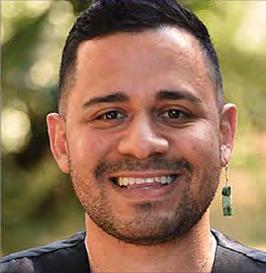
on every chance I could find to get out of the lab and go sing for people.”
He said that the premise of “Forever Plaid” really speaks to him. He lost a family member during the pandemic lockdown and had a major health scare of his own.
“I realized I had no time to lose and I started auditioning for shows as soon as the theaters reopened,” he said. “The Plaids are helping me keep that lesson in mind, and Jinx’s character has really resonated with me.”
Gonzales-Maldonado feels that Jinx teaches the audience that it’s never too late to come out of your shell and shine.
“He starts off very shy, terrified of the spotlight, but with the encouragement of the other Plaids, he eventually allows himself to shine,” he said.
But, as he points out, Jinx doesn’t begin to shine until after he’s dead, but he feels that the lesson still stands.
“When I first came out, I was very insecure and hesitant to be in any kind of spotlight,” he said. “I definitely never imagined myself performing on stage. I sometimes regret having waited until my mid-thirties to start exploring a career in theater, but Jinx is helping me come to terms with that. It may have taken longer than I wish it had, but I got there eventually, and that’s what matters.”
According to Thomas, it’s the music that keeps the audiences coming to see “Forever Plaid” in production after production.
“It’s lovely and timeless,” he said. “It’s the harmonies and the voices. It’s the humor and it’s the heart. When played right, the show makes you love this group, and makes you feel you can reach your dreams as well.”t
‘Forever Plaid,’ April 18-May 5, Gateway Theater, 215 Jackson Street, $25-70. www.42ndstmoon.org

April 18-24, 2024 • Bay area reporter • 15
t
>>
Theater
The Tutor From page 13
Left to Right: Justin P. Lopez, Matt Skinner, Kevin Singer, Edu Gonzalez-Maldonado in Forever Plaid’
Actor Edu Gonzales-Maldonado
Maya Nazzal, Debórah Eliezer and Lawrence Radecker in ‘The Tutor.’
Lois Tema
‘Ahead of the Curve’
By Laura Moreno
The documentary film “Ahead of the Curve,” directed by Jen Rainin and Rivkah Beth Medow, tells the long-awaited real-life story of Franco Stevens and her groundbreaking career as founding publisher of Curve Magazine. The film tells the story of one of the most influential women in lesbian history you’ve possibly never heard of.
Curve is the best-selling and most influential lesbian magazine ever published. The film documents the pioneering magazine’s unlikely start in 1990 by a very young Gen X woman who had herself just recently come out.
What’s more, the story involves a husband and finding herself briefly homeless in San Francisco. Unable to get a business loan to start the magazine, Franco pushed ahead with her idea after a lucky streak at the horse track. At first, she financed the endeavor solo with her credit cards.
The magazine has thus far featured such stars as Martina Navratilova, Melissa Etheridge, Lily Tomlin, Ellen DeGeneres, Lea DeLaria, Tig Notaro, and the cast of “The L Word.”
The Netflix film is a boon to anyone who ever wished she could get into a time machine and see what it was like to be part of the lesbian movement in the 1990s, at the celebratory turn of the century, and through the present time.
The amazing footage exists only thanks to Franco fearlessly taking her staff on cross-country road trips to promote the magazine at large lesbian and LGBT events. The strategy was outrageously successful. The footage documenting the progression of lesbian visibility is perhaps the most noteworthy thing about this unique film.
Producer/director Jen Rainin said she feels “a responsibility to tell the story. We just don’t know where we came from, where our legacy is, what our lineage is.”
The documentary also includes clips of Franco’s nationwide appearance on the Geraldo Rivera Show in the early ’90s. Notably, “Ahead of the Curve” takes us behind the scenes with Franco’s home movies of her first Thanksgiving with her partner at her parents’ house, letting the audience in
<< Japanese Prints
From page 13
allowing vivid reds, purples, and greens. Yoshitoshi used a red representing blood mixed with alum and glue for his series “Twenty-Eight Famous Murders with Verse.”
After the shogunate fell in 1867, the Meiji era with emperor Mutsuhto produced a period of relative stability. Yoshiitoshi’s prints, and his “Hundred Views of the Moon” series, took on new subtlety.
Violence and gruesome fates are now implied, with passages of serenity

on her complicated relationship with her mother. Franco and Rainin live in the East Bay with their two sons
Name Change
When the magazine started, it was originally called Deneuve. By all accounts, the name had nothing to do with iconic French actress

Catherine Deneuve, whose steamy lesbian scenes are featured in the film “The Hunger.” But, like most of us, Catherine Deneuve and her legal team didn’t buy it. What else could Deneuve possibly refer to?
As someone points out in the film, it would have been better to ask the beautiful actress for her permission to use her name from the start. They possibly could have gotten her on board with the ground-breaking endeavor, raising its bold profile even more. Catherine Deneuve sued in 1995 and settled in 1996 on the condition that the magazine change its name. That’s when Franco re-named it Curve.

and beauty, personified by Yoshitoshi’s mature masterpiece, “Fujiwara no Yasumasa Playing a Flute by Moonlight.” The musician stalked by the bandit is saved. His music lulls the would-be attacker. The colors are the most subtle shades of blue and gray and gold.
The Meiji era introduced new subject matter; modernization and a parliamentary form of government which reflected a convergence with western society and norms, at the same time Japan was asserting its own dynamism through industrialization.
Yoshu Chikanobu became a sort of court painter, depicting the royal

family in “A Mirror of Japan’s Nobility” with the emperor wearing a suit resuming a western military outfit. The Empress is depicted in Victorian costume, with the son (borne by one of the emperor’s concubines). The lush patterning of the clothes and decor is later adopted by Gustav Klimt, who collected Japanese prints and kimonos.
X-rated and Pop
The exhibit contains a separate gallery featuring shunga (spring) erotic prints, not included in the catalog. The unexpected inclusion is in keeping with the nature of shunga: private, somewhat furtive delectation. There are several amusing examples of shikake-e (trick pictures). Unsurprisingly, considering the sex of the artists and patriarchal society, male endowment is exaggerated, and apparently irresistible.
“Ukiyo-e Pop” closes the show, featuring woodblock prints by Masami Teraoka, from the “Macdonald’s Hamburgers Invading Japan” and “3l Flavors Invading Japan” series. These prints spoof traditional Ukiyoe, with raunchy “geishas” salivating over oversized ice cream cones, and contrast with Teraoka’s impassioned series on the AIDS pandemic, including the de Young Museum’s
t
‘Japanese Prints in Transition,’ at the Legion of Honor, 100 34th Ave. $12-$32, through August 18. famsf.org/visit/legion-of-honor
Despite Franco suffering a debilitating injury, as well as competition from the internet that created doubts about the future of the publication, Franco brainstormed with LGBT leaders to find a path forward for Curve so that it could continue to be a guiding resource for its readership.
Curve was acquired by Avalon Media in 2010, but when it was faced with the prospect that it might have to fold, Franco re-acquired the magazine in 2021 and helped launch The Curve Foundation.
Curve Magazine is now a nonprofit endeavor under the aegis of The Curve Foundation, which champions lesbian, queer women, transgender and nonbinary people’s stories and culture through intergenerational and community building. The Curve Foundation looks forward to investing in the next generation of leaders.
“Ahead of the Curve” is a fitting tribute to the determination and enterprising leadership of Franco Stevens. She is living proof that a single person with an inspired vision and a crew of dedicated souls can make a huge difference in the world.t
www.curvemagmovie.com
Curve is championing Lesbian Visibility Week April 22-28.
www.lesbianvisibilityweek.com

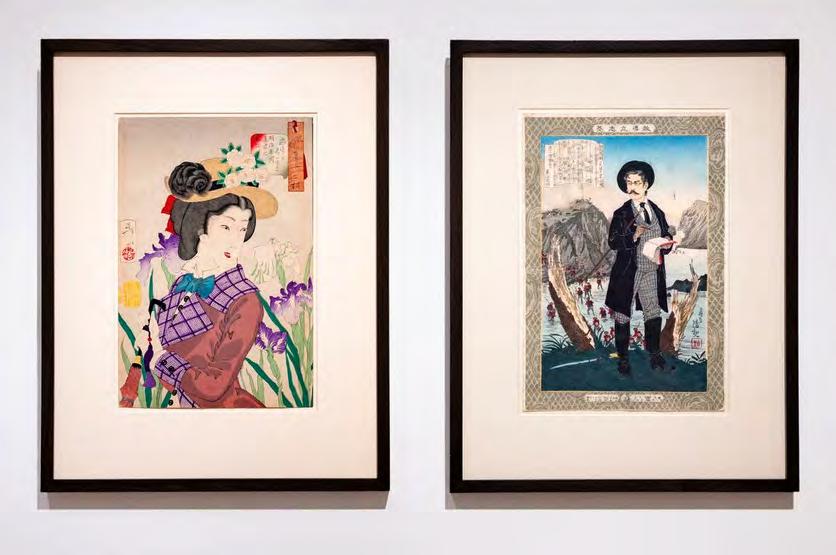
A Path Forward
16 • Bay area reporter • April 18-24, 2024
tribute to Franco Stevens
t << Film
Inspiring
and Curve Magazine
large “American Kabuki (Oishiiwa).” In this work dealing with death and illness, Teraoka hearkens back to Yoshitoshi’s world.
Left: Curve publisher Franco Stevens and her partner, co-director Jen Rainin, in 2021
Right: Franco Stevens (center) at a Dyke March
Both photos: Frankly Speaking Films/Together Films
Curve magazine covers Frankly Speaking Films/Together Films
Above: Masami Teraoka’s ‘Tattooed Woman and Geisha III,’ from the series ‘McDonald’s Hamburgers Invading Japan,’ 2018
Below: Two prints in the exhibit ‘Japanese Prints in Transition,’ at the Legion of Honor
Above: courtesy FAMSF Below: Gary Sexton

 by Victoria A. Brownworth
by Victoria A. Brownworth
Is April still the cruelest month? Not with the kind of bangin’ TV that’s out there.
Season four of “Star Trek: Discovery” had Captain Burnham (Sonequa Martin-Green) and the crew of the U.S.S. Discovery facing a threat unlike any they’ve ever encountered. With Federation and non-Federation worlds alike feeling the impact, they must confront the unknown and work together to ensure a hopeful future for all.
Now in its final season, “Star Trek: Discovery,” is go ing out with a bang. Season 5 has all the things: gays, NBs, two inter-species relationships. The anti-woke incel crowd is furious, but then, aren’t they always? So mad, so sad.
Reach out and touch
Actor Alan Ritchson, star of the “Reacher” series, gave a searing interview to The Hollywood Reporter for their April 10 cover that has been generating a lot of buzz and winning the actor some surprising new fans, like us.
In the interview, Ritchson talked about having bipolar disorder, adult ADHD, being a survivor of a suicide attempt and of sexual assault in his modeling days. It’s an incredibly brave and revelatory interview which should help many come to terms with their own painful pasts.

This time Captain Burnham and the crew of the U.S.S. Discovery uncover a mystery that will send them on an epic adventure across the galaxy to find an ancient power whose very existence has been deliberately hidden for centuries. But there are others on the hunt as well, dangerous foes who are desperate to claim the prize for themselves and will stop at nothing to get it.
“Star Trek: Discovery” Seasons 1 through 4 are currently streaming exclusively on Paramount+.
What has made some cheer and others express outrage is what the devout Christian Ritchson said about GOP presidential nominee Donald Trump.
“Trump is a rapist and a con man, and yet the entire Christian church seems to treat him like he’s their poster child, and it’s unreal. I don’t understand it,” said Ritchson.
“Christians today have become the most vitriolic tribe. It is so antithetical to what Jesus was calling us to be and to do,” he said.
Ritchson also excoriated the police officers who shot Breonna Taylor, a 26-year-old Black EMT, during a noknock raid on her apartment. Taylor was shot eight times, and while the

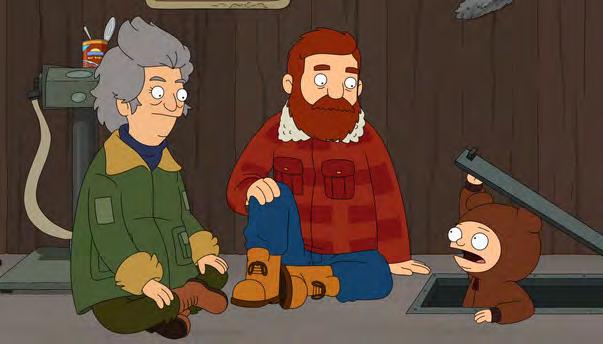
city of Louisville settled a wrongful death complaint with Taylor’s family in the millions, no one was ever charged in her death.
“That was a tragic case,” said Ritchson. “Cops get away with murder all the time, and the fact that we can’t really hold them accountable for their improprieties is disturbing to me. I mean, you shouldn’t have to spend more time getting an education as a hairstylist than as a cop who’s armed with a deadly weapon. We should make it very hard for people to make mistakes or abuse power in our institutions.”
Powerful stuff. When ultra butch men come out against toxic masculinity, the world gets a little safer for everyone else.
Delicate essence
Okay, so we have had approach avoidance to the “American Horror Story” franchise for a long time, and can’t remember when we last finished watching an entire season, but it might have been as far back as “Hotel.” But the twelfth season of “AHS,” “Delicate,” is different.
Based on Danielle Valentine’s book “Delicate Condition,” it’s the first season of the series to be based on a novel instead of having an original storyline. Is this why we love it? Hard to say.
We do know that we are surprisingly captivated by Kim Kardashian’s over the top ‘Is she friend or foe?’ characterization of Siobhan Corbyn and we truly want to save Emma Roberts as the sweet, vulnerable actress Anna Victoria Alcott, who just wants a baby.
Also, we used to love Matt Czuchry in “The Good Wife” and here he plays Anna’s husband, Dexter Harding Jr. and he may or may not be a villain, but his father Dexter Sr. definitely is a villain and that’s a problem.
This is a timely story, with In-Vitro Fertilization at the core. The baby lust that permeates everything for parents who want to conceive is what propels the storyline and makes it so hyper-real. Fold in the obsession with celebrities, the way social media creates false intimacies with celebs, and the story almost writes itself.
Oh, and there’s a cult, because everyone looks good in black. And there are insects. And maybe a little “Rosemary’s Baby” thing happening. Maybe. Because nothing is as it seems in “Delicate.”
As for Kim, in her role as Anna’s publicist, she slaps people, she kisses women, and does a lot of things we don’t associate with the “KUWTK” franchise. It’s wild. We cannot get enough of her and hope she becomes an “AHS” regular.
“Delicate” also stars some of our fave Ryan Murphy folks; Denis O’Hare, one of the great gay actors, plays Anna’s fertility doctor. Yeah, that’s not good.
“Pose” star Michaela Jaé Rodriguez plays Nicolette, who works for Anna and Dex. Cara Delevingne plays Anna’s stalker, Ivy , along with other “AHS” regulars. It’s a hugely queer, NB
Dirt (Jane Lynch), who’s been living in an underground bunker for decades, on her first trip to the Alaska town’s gay bars.
The series also stars our fave straight allies, Nick Offerman as Beef and Meghan Mullally as Alyson Lefebvrere. Dulcé Sloan plays Honeybee. It’s fun and has been renewed for a fifth season, so it’s safe to fall in love with it. On Fox, Hulu and Amazon.
Saving Ryan’s …
“Saturday Night Live” is hit or miss and you just never know which it will be, but the April 13 had the always reliable Ryan Gosling as host and he was, in a word, great. You can watch the entire episode on Peacock, but the cold open was hilarious with our fave lesbian comedian and “SNL” alum Kate McKinnon reprising her role as a trailer trash alien abductee with a very foul mouth. We don’t want to spoil it, but she does play around with Gosling’s Area 51.
and trans cast and a truly wild season. “Delicate: Part Two” just dropped on FX/Hulu, but you must watch “Delicate: Part One” first.
Alaskan laughline
“The Great North” is the cutest animated comedy show. Beef Tobin is a single father living in the fictional town of Lone Moose, Alaska with his four children Wolf, Ham, Judy, and Moon, as well as Wolf’s wife Honeybee. Beef’s life is centered on raising his kids and keeping the family together. He is sometimes overbearing and smothering, but his deep love for his family is a central theme in each episode in the series.
In the current season 4, episode 8, Ham Tobin (Paul Rust), the family’s gay teenager, takes his lesbian Aunt
Then Gosling did his monologue in which he sang and played piano, with a surprise cameo from “Oppenheimer” star Emily Blunt, and it was fabulous.
Johnny boy
“Hacks” star Johnny Sibilly, also known for “Pose,” and for playing Noah Hernandez in Peacock’s “Queer as Folk” reboot, has been cast on ABC’s “Station 19.” That series is now in its seventh and final season. Sibilly’s character Dominic is, according to promos, a “recently single, charming, charismatic EMS firefighter whose calming nature puts people in crisis at ease.” Sibilly made his “Station 19” debut April 11.
So for fun, frolicksome and feisty, you really must stay tuned.t


Wednesday 8am (last seating 9:45pm)
Thursday 8am
Open 24 Hours
Friday
Open 24 Hours
Saturday
Open 24 Hours
Sunday 7am (last seating 9:45pm)

April 18-24, 2024 • Bay area reporter • 17 Boldly go, girl The Lavender Tube on ‘Star Trek: Discovery,’ Alan Ritchson, ‘AHS’ and more t TV>> 3991-A 17th Street, Market & Castro 415-864-9795 Proudly serving the community since 1977.
Daily! New Adjusted Hours
Open
Monday 8am (last seating 9:45pm)
Tuesday 8am (last seating 9:45pm)
Kate McKinnon and Ryan Gosling on ‘Saturday Night Live’ NBC
Above: Kim Kardashian in ‘American Horror Story: Delicate’
Below: ‘The Great North’s Aunt Dirt, Beef and Moon (voiced by Jane Lynch, Nick Offerman and Aparna Nancherla)
Both photos: FX/Hulu
Left: David Ajala, Sonequa Martin-Green and Wilson Cruz in ‘Star Trek: Discovery’ Right: Alan Ritchson in ‘Reacher’ Paramount+ Amazon Prime
‘Candy Darling: Dreamer, Icon, Superstar’
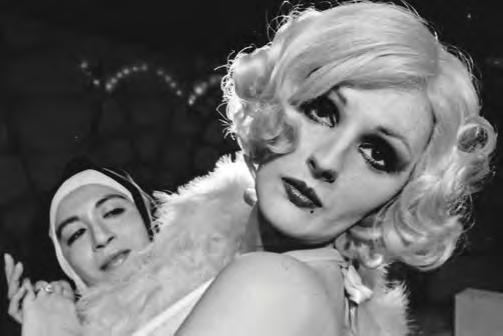 by Mark William Norby
by Mark William Norby
Not since the 1959 release of Richard Ellman’s legendary biography of James Joyce has the literary world met its match in Cynthia Carr’s “Candy Darling: Dreamer, Icon, Superstar” (Farrar, Straus and Giroux).
Astonishing at every turn, Carr deeply excavated the Darling archive in order to bring a pioneering trans woman into the spotlight of 1970s New York.
Carr’s Darling biography is fascinating and at times overwhelming in its detail and precision. But it never fails to fascinate and always celebrates the trans community with love and compassion that, if the biography reaches Ellman’s deserved longevity, will stand as an uncategorical masterpiece in scholarship.
Best known as a Warhol Superstar for her roles in “Flesh” (1968) and “Women in Revolt” (1971), Carr
claims Darling was not a Warhol Superstar but rather a superstar in her own right. A muse to Lou Reed and the Velvet Underground, to Tennessee Williams – she starred in several of William’s plays including “Small Craft Warnings,”– Darling was also an idol to the Warhol trans superstars Jackie Curtis and Holly Woodlawn.
Hollywood dreams
Born James (Jimmy) Lawrence Slattery on November 24, 1944, Candy Darling died in Manhattan at 29 years of leukemia and lymphoma on March 21, 1974. She spent her early years in Massapequa Park, Long Island where she and her mother Theresa Slattery, a bookkeeper, moved after her mother’s divorce from Candy’s father, James Slattery, a violent alcoholic. Darling grew up watching Hollywood films, obsessed with Hollywood stars, often skipping school to watch




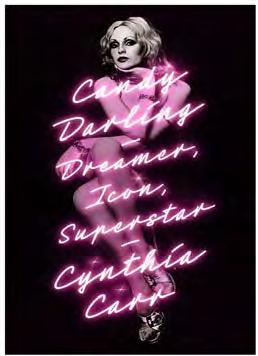
view magazine, is quoted that “Candy would walk in and ‘the room would always stop … because Candy looked different than the Park Avenue Ladies. She was glamorous but it wasn’t a polished Chanel/Dior kind of glamor. She was always a little disheveled. Candy’s makeup sometimes appeared smudged. So when she came in, heads would swivel and people would start to whisper.’”
old movies. First interested in adopting the name Kim, after Kim Novak, whom she greatly admired, she settled on Hope Slattery which, according to Holly Woodlawn, quickly became Hope Dahl; other names included Candy Dahl, Candy Cane, before finally arriving at Candy Darling. Darling began cross-dressing in 1961. Her mother insisted Candy come home after dark to avoid being seen by neighbors in Massapequa. Candy soon began frequenting a local gay bar called The Hayloft. She began taking the train from Long Island to Greenwich Village.
Film fame
Darling met writer and producer Jeremiah Newton on a train from his home in Flushing, Queens in the summer of 1966. Newton and Darling shared an apartment in Manhattan and Brooklyn and were friends up until Darling’s death. Newton produced the 2010 documentary “Beautiful Darling: The Life and Times of Candy Darling, Andy Warhol Superstar,” a 2010 feature-length documentary. Darling first spotted Andy Warhol at the gay bar The Tenth of Always, an after-hours club in the Village where Warhol and Lou Reed hung out from 1968-1972. She was with Jackie Curtis who invited Warhol to a play she wrote and directed, “Glamour, Glory and Gold,” starring Darling and a young Robert De Niro. Warhol immediately included Darling in the Superstar scene and at the parties and overabundance of socialites at The Factory, Warhol’s art production facility and often the settings for his films.
The well-known publicist R. Couri Hay, among the original editors of Warhol’s and John Wilcock’s Inter-
For the book, Couri told Carr that the two would meet at Ciandre’s to get their hair done.
“Eugene [stylist], of course, did not charge them. ‘We would sit side by side, and they’d be shampooing our hair. It was a fun thing we shared. Eugene was a genius with hair and with makeup. He was able to take Candy from looking a little bedraggled into looking like a Jayne Mansfield, super glamourous Jean Harlow, Marilyn Monroe woman.’”
It’s these details that fill the book and which Carr brilliantly pulls together in a fashion that can only be described as transcendent and intensely obsessional.
Darling’s decline
Carr exalts her subject with a truth that, for the young Jimmy Slattery, already had been reaching for the “spectral,” the “astral,” as writer Julie Baugold said. “She was very beautiful and so
white that she was almost translucent … she was playing the part of a beautiful girl dying.”
Even before her diagnosis with leukemia and lymphoma, Darling often wrote in her diary about death. When she entered the hospital, in and out for stints of treatment and recovery, “Warhol sent her a portable black-and-white television … But she wasn’t pleased. That day when Jeremiah arrived, she told him, ‘You bring this down to Andy and tell him I want a color one.’”
After many hospitalizations at Cabrini Medical Center in New York City, Darling succumbed to lymphoma. She wrote on her deathbed to friends at The Factory, “Unfortunately before my death, I had no desire left for life ... I am just so bored by everything. You might say bored to death.”
Darling’s funeral was attended by huge crowds at the Frank E. Campbell Funeral Chapel. R. Couri Hay and Julie Newmar delivered Darling’s eulogy. Warhol did not attend the funeral.
Jeremiah Newton, known for later writing and producing the 1996 film “I Shot Andy Warhol,” interred Darling’s ashes in Cherry Valley Cemetery in Cherry Valley, New York.t
‘Candy Darling: Dreamer, Icon, Superstar’ by Cynthia Carr, Farrar, Straus and Giroux/Macmillan, $30 www.us.macmillan.com
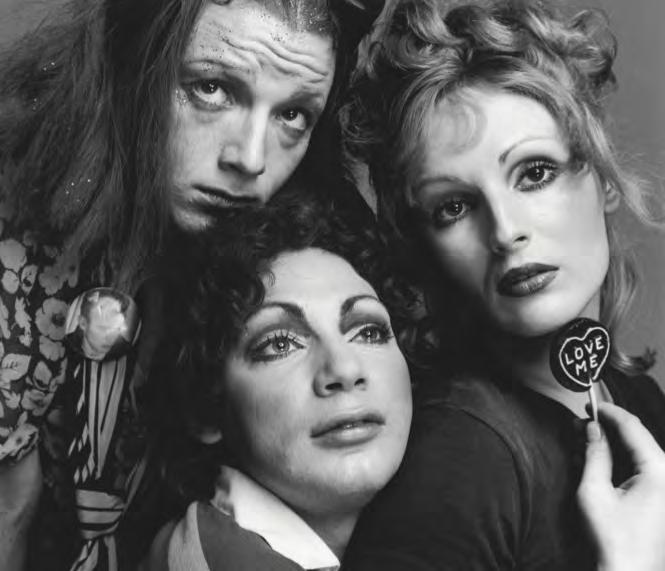
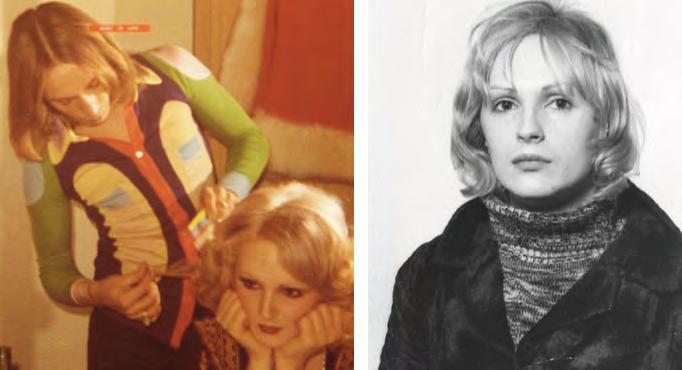



18 • Bay area reporter • April 18-24, 2024
t << Books StevenUnderhill 415 370 7152 • StevenUnderhill.com Professional headshots / profile pics Weddings / Events
Biographer Cynthia Carr
Candy Darling with Hortencia Colorado in Tom Eyen’s ‘The White Whore and the Bit Player’ early in 1973.
Jack Mitchell/Getty Images
Above: Candy Darling, Jackie Curtis, and Holly Woodlawn in the June 1972 issue of Vogue
Below Left: Eugene Siefker working on Candy Darling’s hair in 1968.
Below Right: Candy’s passport photo
Above: Richard Avedon Below right: courtesy of Jeremiah Newton
National Poetry Month LGBTQ reading list
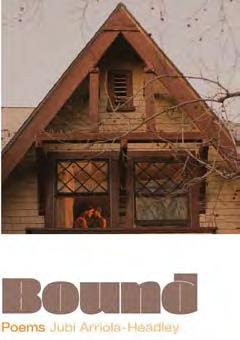 by Gregg Shapiro
by Gregg Shapiro

To paraphrase T.S. Eliot, April (aka National Poetry Month), is the queerest month. There are so many books from which to choose before April’s end, and beyond, of course, that it’s difficult to know where to begin. How about alphabetically?
South Florida-based Black homoflexible poet Jubi Arriola-Headley returns with his second book “Bound” (Persea Books, 2024) in which he addresses sexuality, race, gender, sex, and pleasure. Family also plays a prominent role in poems including “Questionnaire I,” “Requiem,” “Jack,” “N’Jadaka’s Appeal,” and “Thanksgiving.” Arriola-Headley’s accessibly experimental side glows in “Letter to My Nether Regions” and “black (v.).”
Poet, queer literary authority, editor, and retired educator David Bergman has kept us waiting 25 years for the arrival of his new book of poetry “Plain Sight” (Passager Books, 2024). Baltimore-based Bergman’s third fulllength collection features “The Man Who” series consisting of more than a dozen poems (some grouped together, some interwoven into other sections), which, according to Bergman, developed from his “fascination with the case studies of Krafft-Ebing, Freud, and Oliver Sacks.”
Like Arriola-Headley, gay poet Richard Blanco, the fifth presidential inaugural poet in our country’s history, as well as a National Humanities Medal recipient, is based in South Florida (in addition to Maine).
Blanco’s lates book, “Homeland of My Body: New & Selected Poems” (Beacon Press, 2023) features more than 30 new poems, bracketing older poems culled from four of his earlier full-length collections.
Featuring poems that have previously been published in Poetry, The Adroit Journal, and Foglifter, as well as advance praise from Terrance Hayes, “Orders of Service” (Alice James Books, 2023), the debut collection from Black nonbinary poet Willie Lee Kinard III, winner of the 2022 Alice James Award, is one of the most eagerly anticipated books of the year. Deservedly so, because poems such as “The Sugar,” “Barbicide,” “A Tangle of Gorgons,” “Aubade: Nocturne,” and “Elegy,” herald the arrival of a new and necessary queer voice in poetry.
Queer poet and historian Kim Roberts joins the collaboration club with her new cross-disciplinary chapbook “Corona/Crown” (Word Tech Editions, 2023). Roberts’ project is particularly distinguished in that her collaborator is fine art photographer and foreign service officer Robert Revere. Co-created in response to the impact that the pandemic had on them individually regarding the sensation of being cut off from the cultural enrichment of visiting museums and other such venues. The pairing of Roberts’ poems and Revere’s photos creates a kind of gallery of the page.
The queer daughter of Cuban exiles, Leslie Sainz is the author of “Have You Been Long Enough at Table” (Tin House, 2023), a debut poetry collection worthy of your time and attention, particularly now with the increased focus on the ongoing migrant crisis. Indelible poems including “Ño,” “Miguelito/Marielito,” “Climate Feed-

back,” “Notice to Appear,” “Nature and Nurture, Miami, FL,” will ring in your ears long after the book is closed.
While not a member of the LGBTQ community, the late poet Jean Valentine had a lasting impact on countless writers, gay and straight, and was praised by Adrienne Rich. The admirable “Light Me Down: The New & Collected Poems of Jean Valentine” (Alice James Books, 2024) spans a period of nearly 60 years. It also incorporates almost 30 new poems, including “Dear Adrienne,” for Rich.
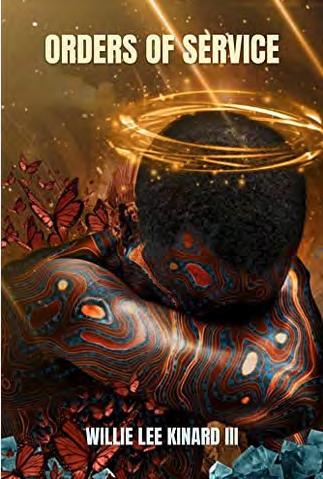
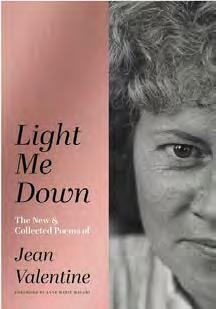

Winner of the 2024 William Meredith Book Award for Poetry, “The Porpoise in the Pink Alcove” (Forest Woods Media Productions, 2024) by lesbian poet and journalist Kathi Wolfe is as personal as it is geographi-


cal. Wolfe’s poems sing of Hollywood and D.C. with the same starstruck (and occasionally jaded) red carpet reverence, along with a healthy dose

of humor. When she writes of being disabled and queer, her tone may shift a bit, but it’s no less effective, as exemplified in her William Carlos Williams homage “This Is Just to Say.”
A legend in the spoken word scene since the early 1990s, prolific poet Emanuel Xavier’s new book is “Love(ly) Child” (Queer Mojo/ Rebel Satori, 2023). The book is bracketed by “Old Pro,” in which Xavier writes about his “experiences as a queer poet of color and being sex positive,” and “Fancy,” featuring a direct reference to the collection’s title. In between, the poems deal with themes of queerness and family in Xavier’s distinctive voice.t

April 18-24, 2024 • Bay area reporter • 19
t Books >> This resource is supported in whole or in part by funding provided by the State of California, administered by the California State Library in partnership with the California Department of Social Services and the California Commission on Asian and Pacific Islander American Affairs as part of the Stop the Hate program. To report a hate incident or hate crime and get support, go to https://www.cavshate.org/.

This Earth Day plant your feet.
And see how the Earth moves you.
One day just isn’t enough. Join us as we celebrate our planet all month long. Explore rocky tidepools during the City Nature Challenge, dive into coral reefs with an Academy talk, or marvel at blooming wildflowers on our Living Roof. Whether in your community or at the Academy, there are so many ways to join the movement to regenerate the natural world. calacademy.org/earthmonth























 Liz Highleyman
Liz Highleyman




























 by Jim Gladstone
by Jim Gladstone


 Debórah Eliezer and Maya Nazzal in ‘The Tutor’
Passion play’s penetrating perspectives at NCTC
Debórah Eliezer and Maya Nazzal in ‘The Tutor’
Passion play’s penetrating perspectives at NCTC
 by David-Elijah Nahmod
by David-Elijah Nahmod
 by Jim Provenzano
by Jim Provenzano





















 by Victoria A. Brownworth
by Victoria A. Brownworth






 by Mark William Norby
by Mark William Norby







 by Gregg Shapiro
by Gregg Shapiro










